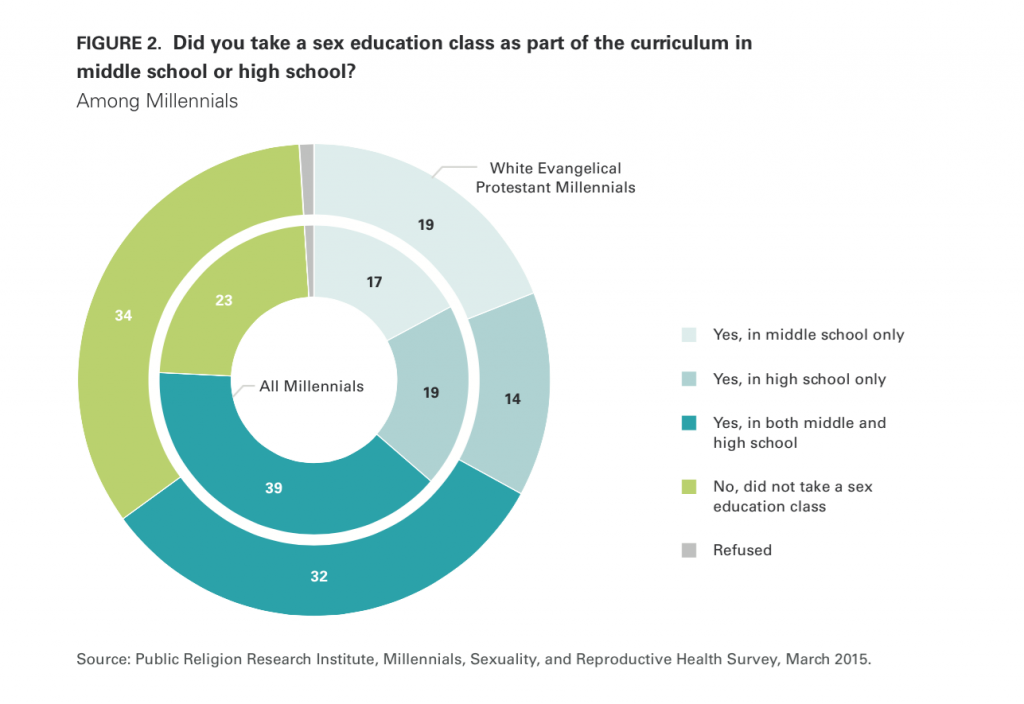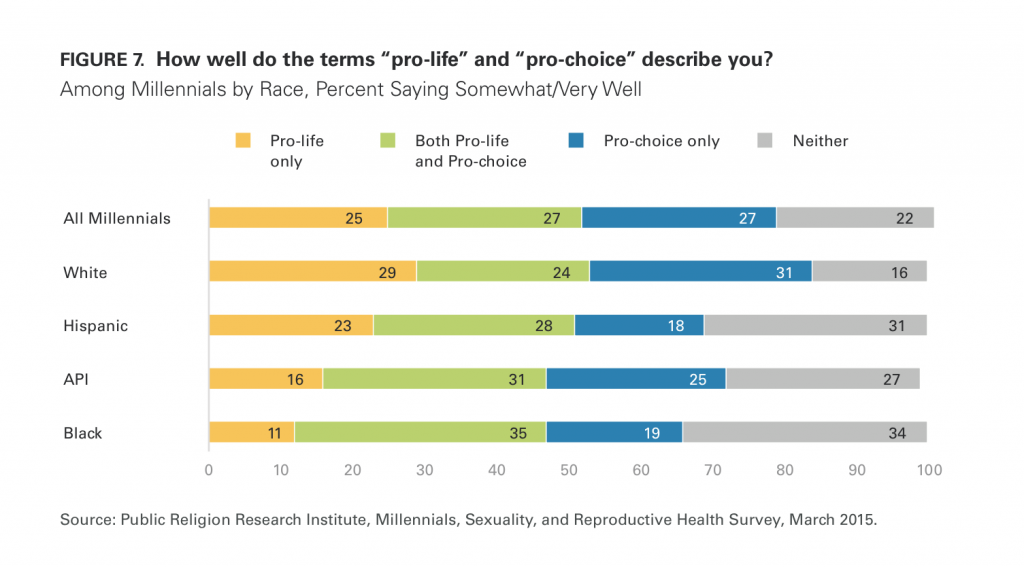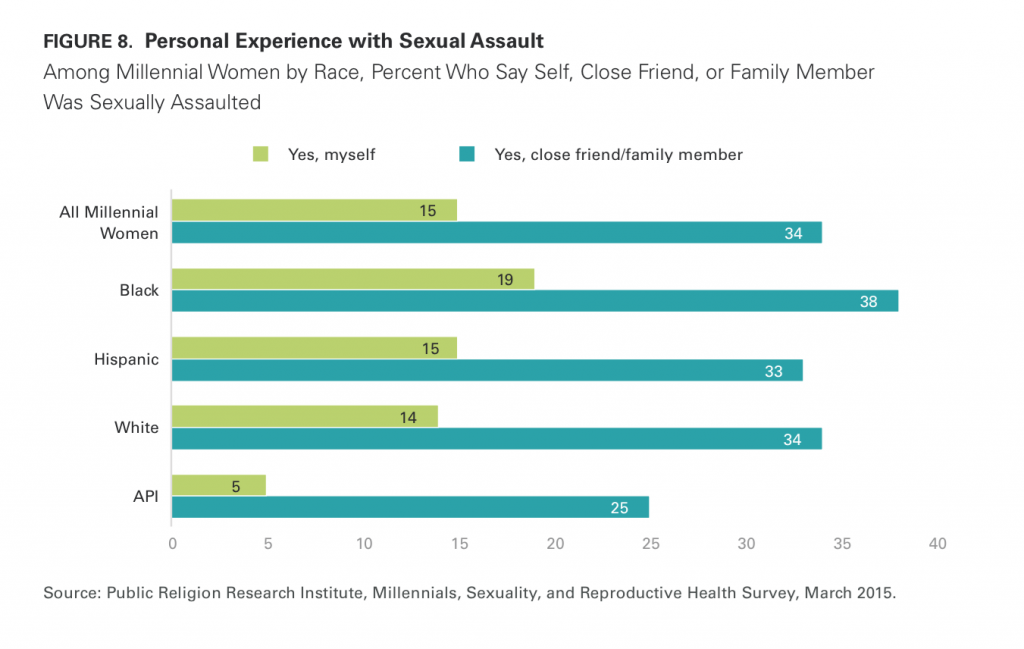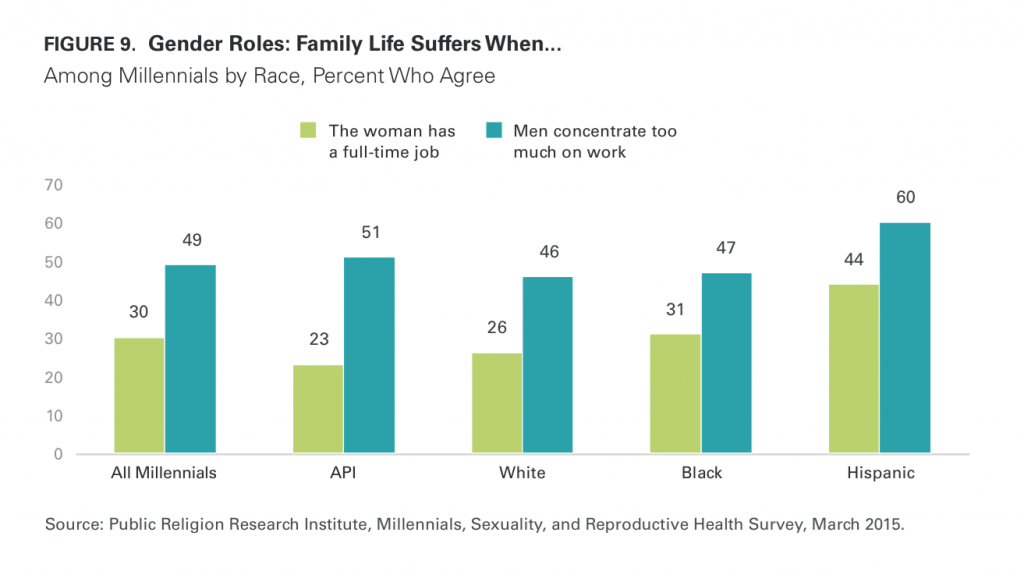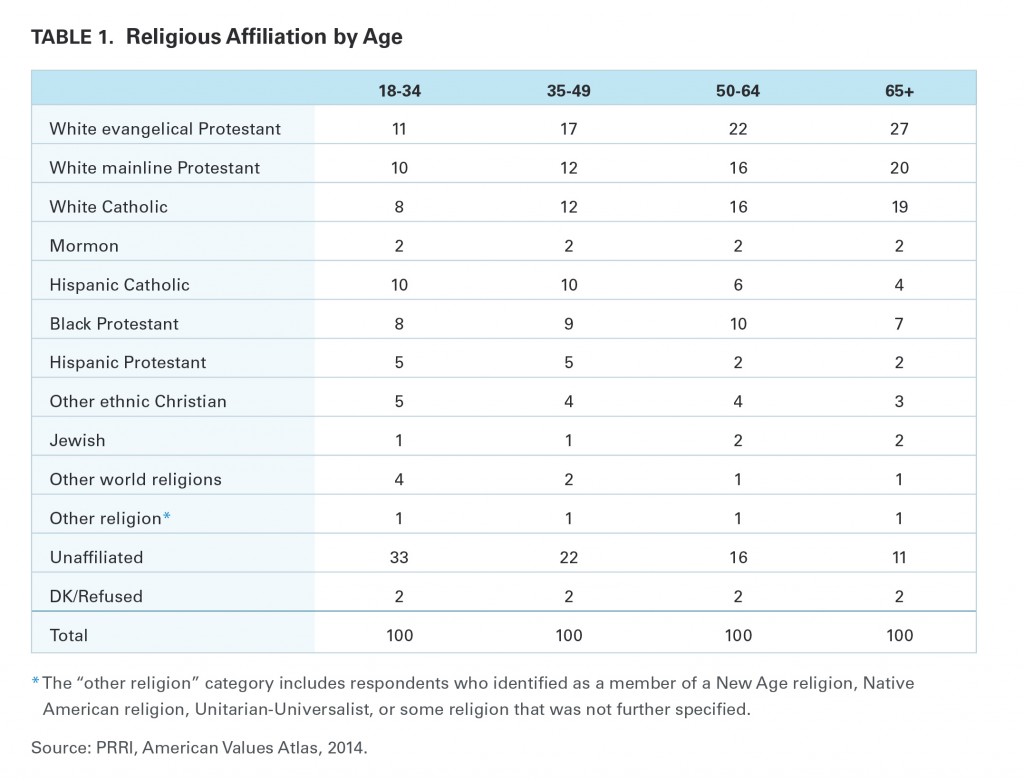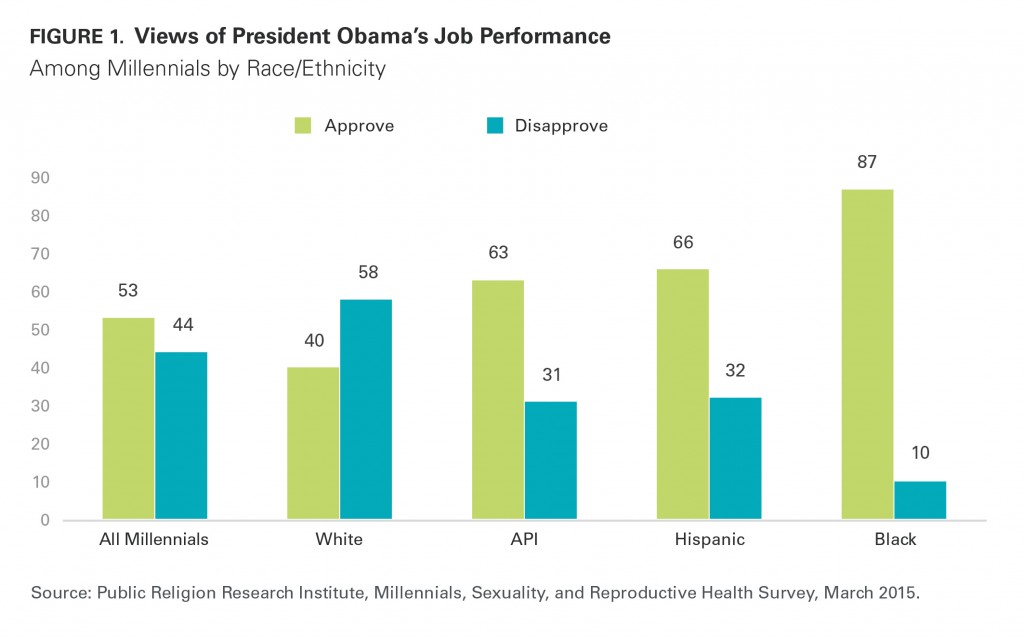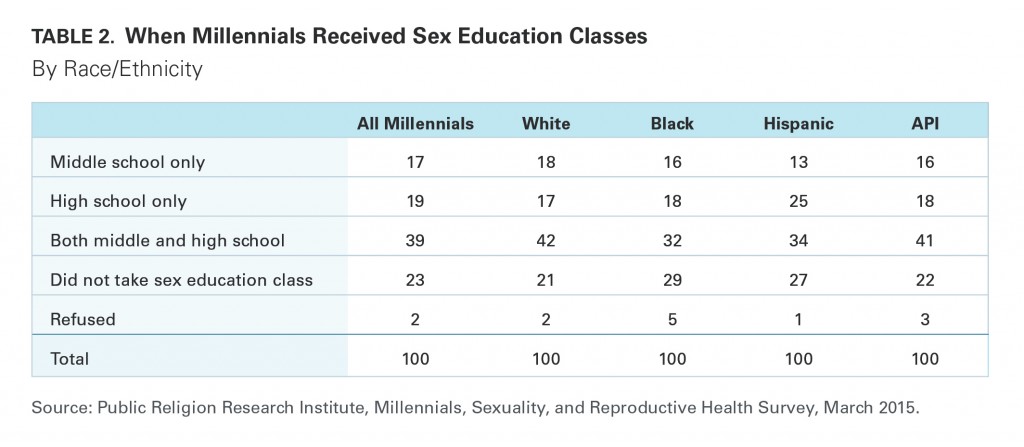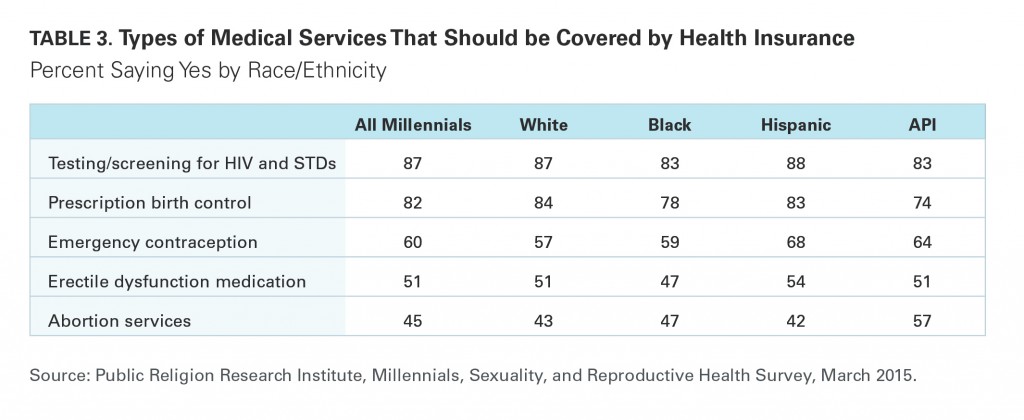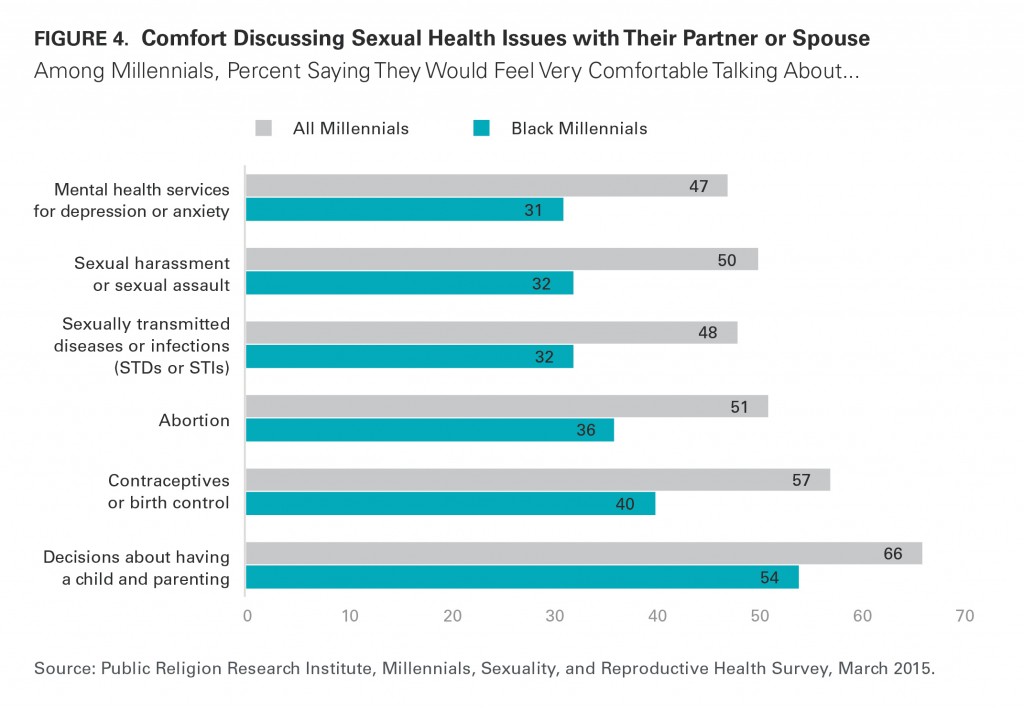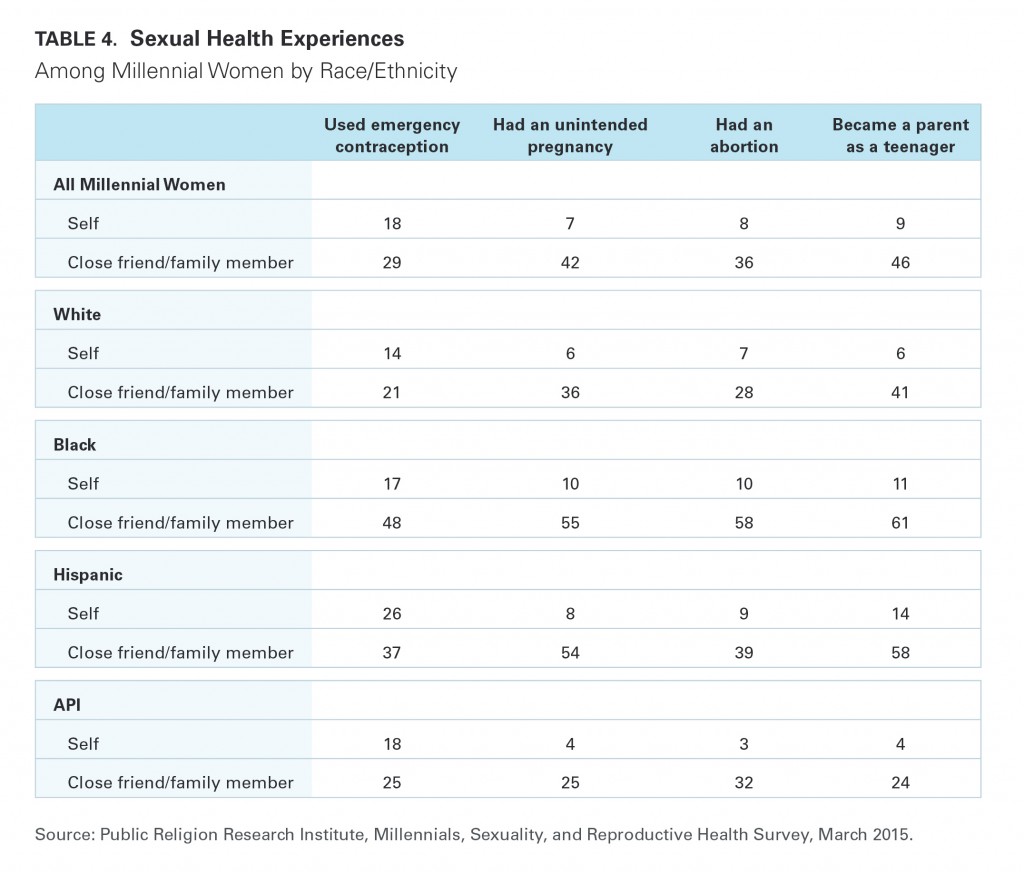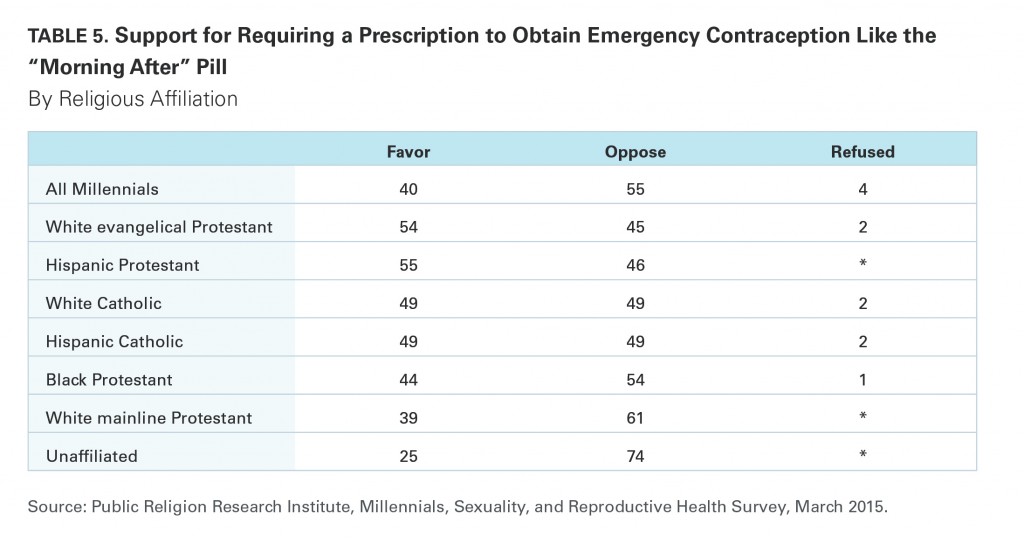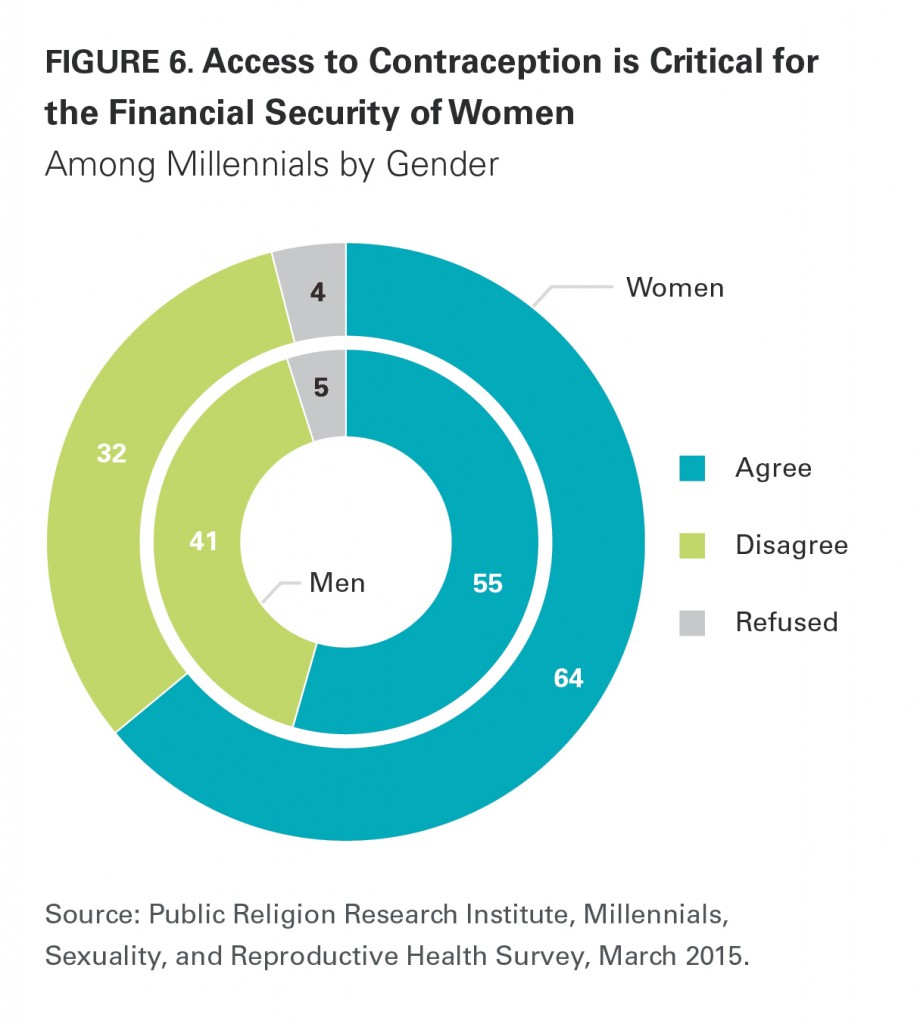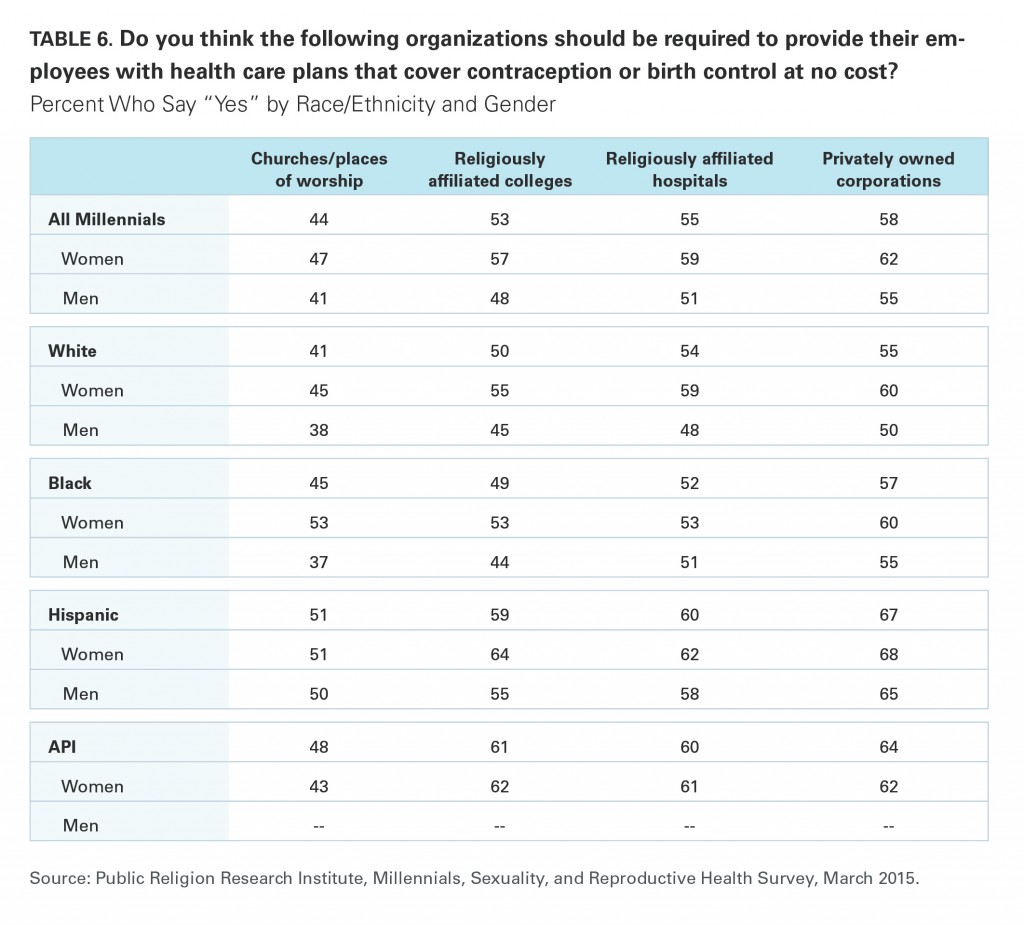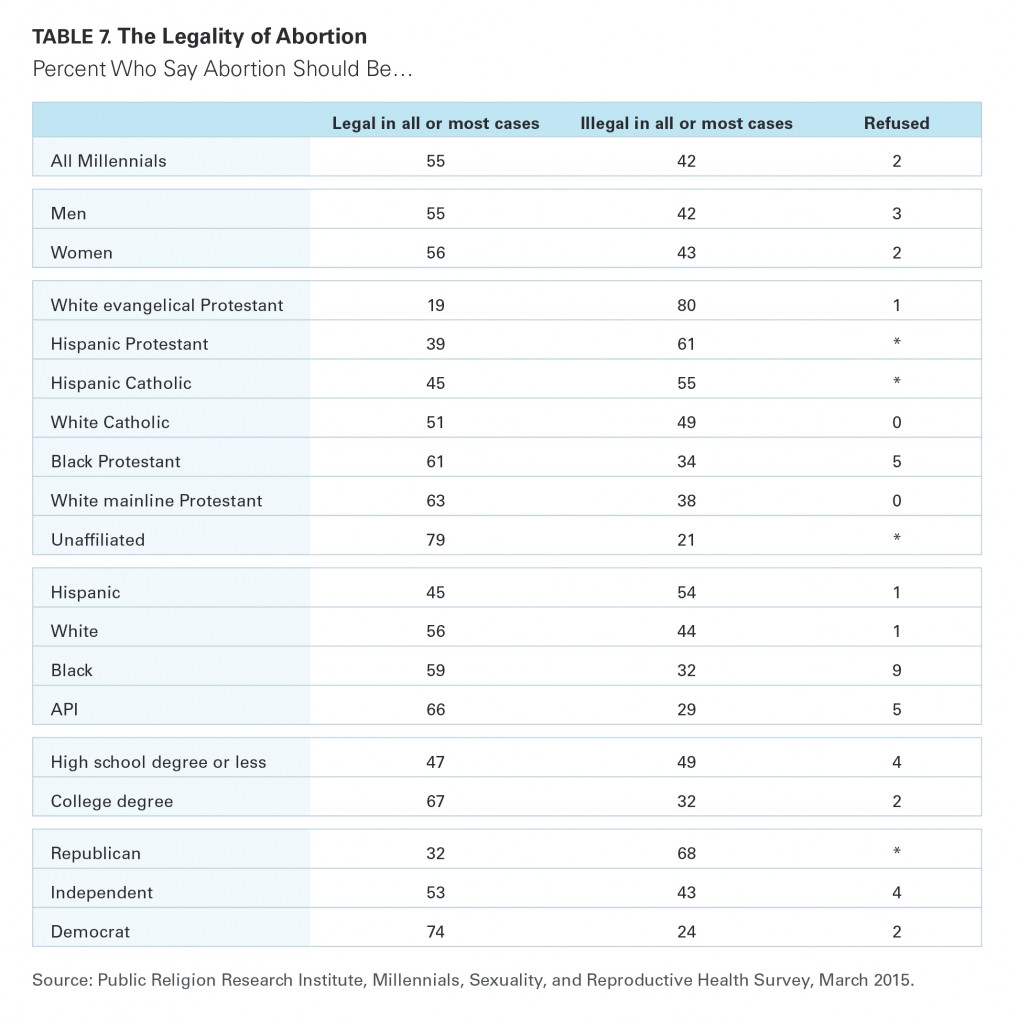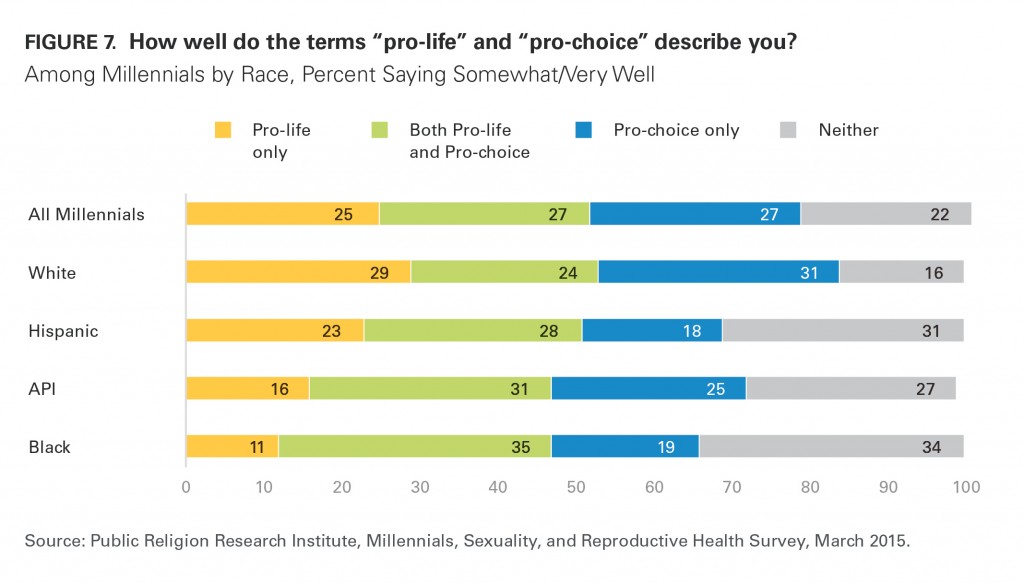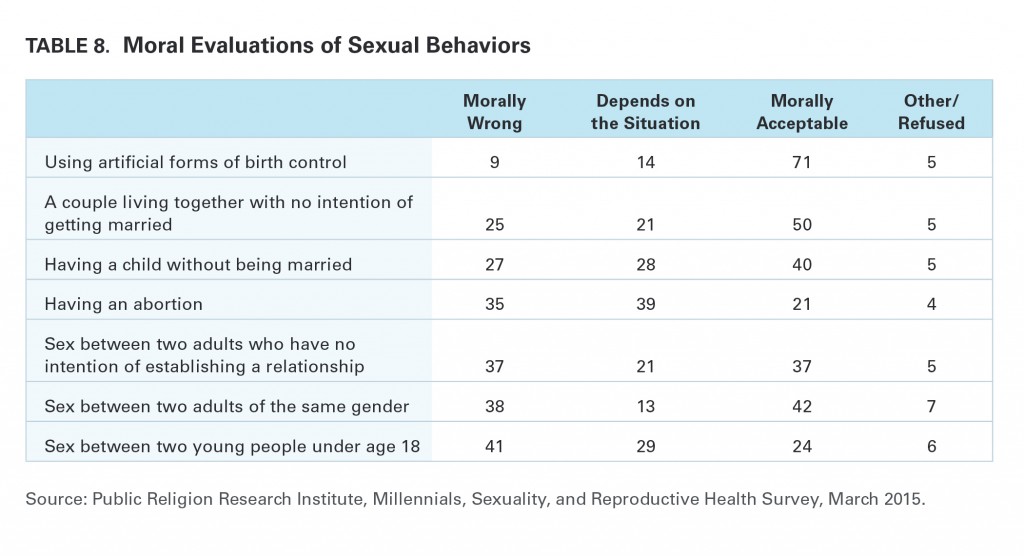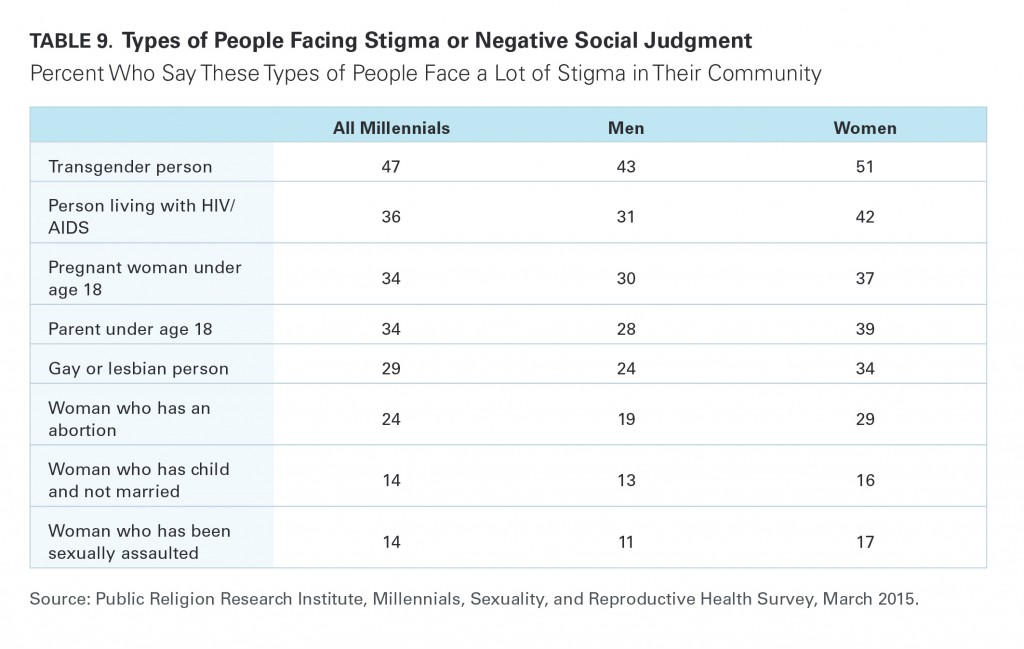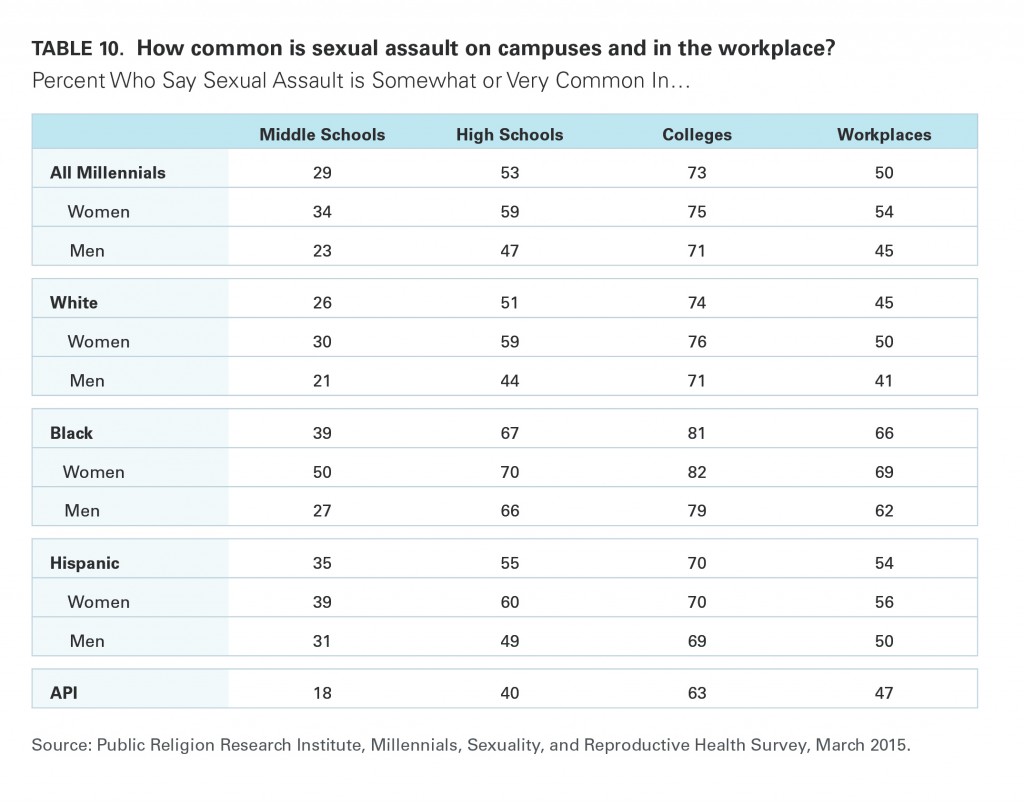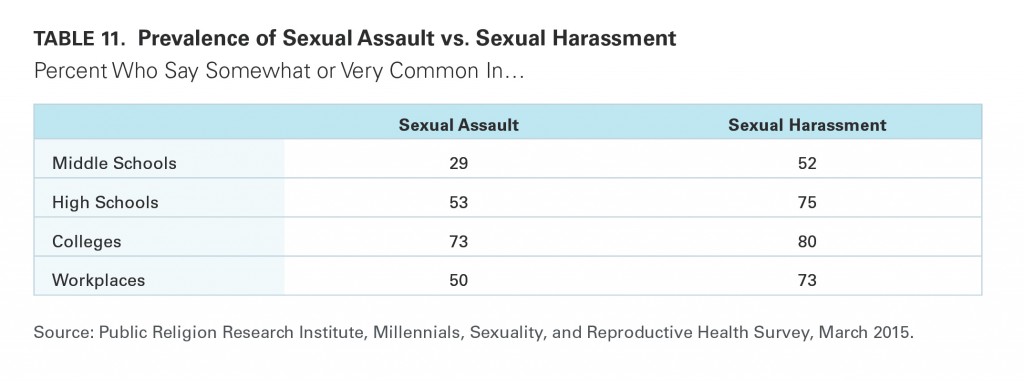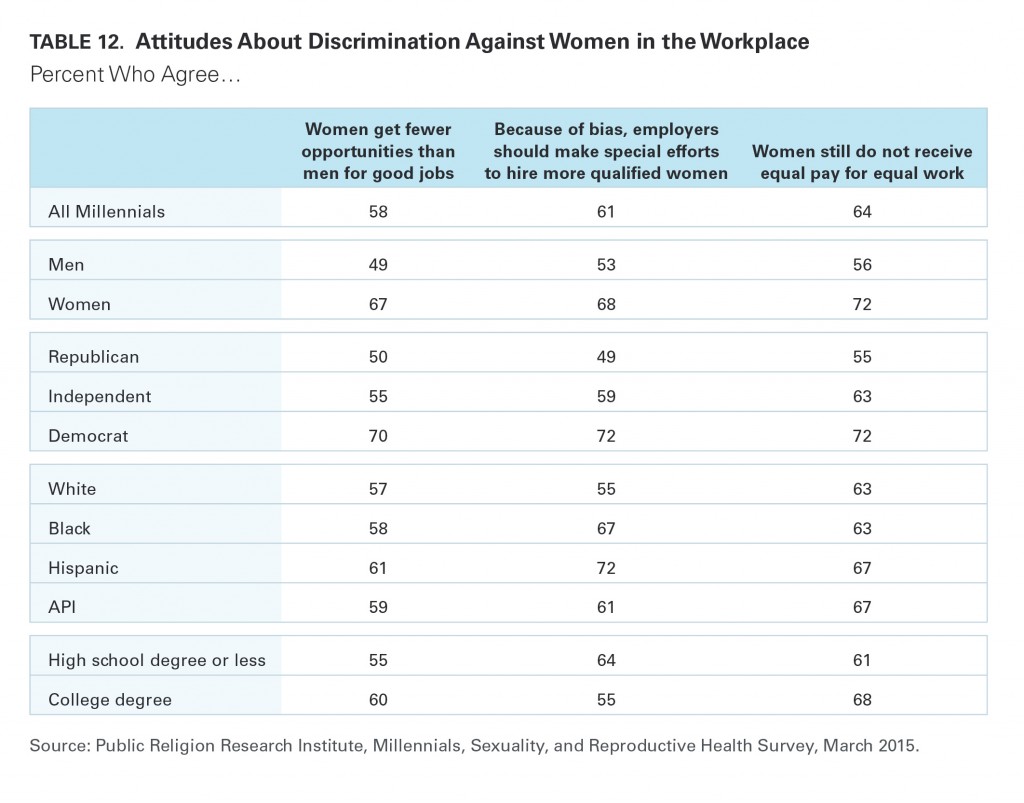How Race and Religion Shape Millennial Attitudes on Sexuality and Reproductive Health
Executive Summary
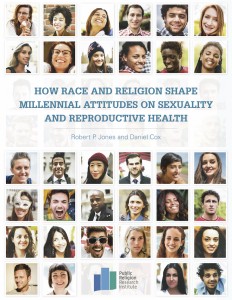 A majority (53%) of millennials say the country has gotten pretty seriously off on the wrong track, compared to 45% who say it is going in the right direction. White and black millennials are near mirror opposites: close to two-thirds (64%) of white millennials say the country has gotten off on the wrong track, while more than seven in ten (71%) black millennials say it is moving in the right direction. A majority (53%) of Hispanic millennials also say the country is moving in the right direction. Asian-Pacific Islander (API) millennials are more divided—49% say right direction, 46% say wrong track.
A majority (53%) of millennials say the country has gotten pretty seriously off on the wrong track, compared to 45% who say it is going in the right direction. White and black millennials are near mirror opposites: close to two-thirds (64%) of white millennials say the country has gotten off on the wrong track, while more than seven in ten (71%) black millennials say it is moving in the right direction. A majority (53%) of Hispanic millennials also say the country is moving in the right direction. Asian-Pacific Islander (API) millennials are more divided—49% say right direction, 46% say wrong track.
Sex Education
Three-quarters (75%) of millennials favor teaching comprehensive sex education in public schools, while 21% are opposed. Support for this policy cuts across all racial, ethnic, and religious groups.
Nearly one-quarter (23%) of millennials report they did not have a sex education class in middle or high school. Notably, millennials who attended religious high schools are significantly more likely than those who attended public high schools to report that they had no sex education courses (32% vs. 21%, respectively).
Among millennials who had a sex education class in school, nine in ten say that the information they received is very (39%) or somewhat (51%) accurate. However, nearly four in ten (37%) millennials say that sex education classes were not helpful to them in making decisions about sex and relationships. Black (27%) and Hispanic millennials (32%) are about twice as likely as white (14%) and API millennials (12%) to say that sex education classes were very helpful to them in making decisions about sex and relationships.
More than two-thirds (67%) of millennials say that emphasizing safe sexual practices and birth control is a better way to prevent unintended pregnancy than emphasizing abstinence from sex (23%). There is general agreement across racial and ethnic lines on this question. White evangelical Protestant millennials stand apart from other millennials, with half (50%) favoring an emphasis on birth control, compared to 40% favoring an emphasis on abstinence, and eight percent in favor of emphasizing both.
Health Insurance Coverage
More than eight in ten millennials say that health insurance should include coverage for HIV and STD testing (87%) and prescription contraception (82%). Sixty percent say that emergency contraception should also be covered by health insurance, although support is somewhat greater among millennial women than millennial men (64% vs. 56%, respectively). Less than half (45%) of millennials say abortion services should be covered by health insurance, while 51% say they should not be covered. Views about abortion coverage are stratified by educational attainment: a majority (54%) of millennials who have a four-year college degree, versus only 38% of those with a high school degree or less, support health insurance covering abortion.
A majority (58%) of millennials—including majorities of API (64%), Hispanic (67%), black (57%), and white millennials (55%)—say privately owned corporations should be required to provide their employees with health care plans that cover contraception. However, strong political divisions persist. While 73% of Democratic and 57% of independent millennials say privately owned corporations should be required to provide contraception coverage in employees’ health care plans, only 38% of Republican millennials agree.
Comfort Discussing Sexual Health Issues
The degree to which millennials feel very comfortable discussing health issues varies considerably depending on the topic and the other person involved in the conversation. Two patterns stand out consistently across health topics: black millennials are less likely than other millennials to feel very comfortable discussing health matters with their spouse or partner, and API millennials are less likely to feel very comfortable talking about these topics with their parents. For example, white (51%), API (52%), and Hispanic millennials (46%) are more likely than black millennials (32%) to say they are very comfortable talking about STIs with their partner or spouse.
When seeking out information about sexual health and relationships, millennials most regularly rely on three sources: doctors (45%), friends (44%), and the Internet (43%). Fewer millennials say they consult their parents (30%), a religious leader (11%), a therapist (11%), or a teacher (10%) for information pertaining to sexual health.
Sexual Health Experiences
Nearly one in five (18%) millennial women report having used emergency contraception at some point, and roughly three in ten (29%) say a close friend or family member has used this form of birth control. Less than one in ten (7%) millennial women report having an unintended pregnancy, although this experience is common within their social network—42% report that this has happened to a close friend or family member. Eight percent of millennial women report that they themselves have had an abortion, but four times as many (36%) say a close friend or family member has had an abortion. A similar number of millennial women (9%) report that they became a parent as a teenager, while nearly half (46%) of millennial women say that a close friend or family member became a parent as a teenager. The sexual health experiences of millennial women vary considerably by race and ethnicity. Hispanic millennial women report higher usage of emergency contraception than millennial women overall. Black millennial women are more likely than other millennial women to know someone who has had an abortion.
Only one percent of millennials overall report that they themselves are HIV positive or have AIDS, but 13% report that they have a close friend or family member living with HIV or AIDS. Black (23%) and Hispanic millennials (21%) are more than twice as likely as white (8%) or API millennials (9%) to say they have a close friend or family member who is HIV positive or has AIDS.
Contraception
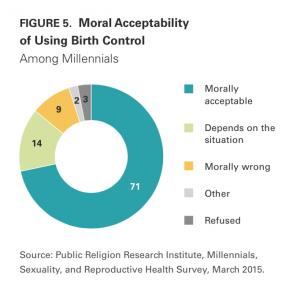
More than seven in ten (71%) millennials say that using artificial birth control is morally acceptable, compared to fewer than one in ten (9%) who say it is morally wrong. Fourteen percent say it depends on the situation. Overwhelming majorities of virtually every subgroup of millennials say it is morally acceptable to use contraception. Nearly eight in ten (78%) millennials also favor making all forms of legal contraception readily available on college campuses.
Most millennials (55%) oppose requiring a prescription to obtain emergency contraception, like the “morning after” pill, while 40% are in favor of this requirement.
Eight in ten (81%) millennials favor increasing access to contraception for women who cannot afford to pay for it. Notably, this support for increasing access to birth control for women cuts across all racial, ethnic, religious, and political groups.
Six in ten (60%) millennials—including 64% of women and 55% of men—agree that access to contraception is critical for the financial security of women, while more than one-third (36%) disagree. Seventy-three percent of Democratic millennials and 58% of independent millennials say that access to contraception is critical for women, while less than half (44%) of Republican millennials agree.
Abortion
Millennial attitudes about the legality of abortion generally mirror the attitudes of the general public. A majority of millennials say that abortion should be legal in most cases (33%) or legal in all cases (22%), while more than four in ten say it should be illegal in most cases (27%) or illegal in all cases (15%). A majority (55%) of millennials also say at least some health care professionals in their community should provide legal abortions, compared to 36% who disagree, and seven percent say they are unsure or that it depends on the circumstances. Notably, however, there are no significant differences between the opinions of millennial men and women on the issue of abortion.
Millennials are divided by religion on the issue of abortion. On one side, at least six in ten black Protestant (61%) and white mainline Protestant millennials (63%) say abortion should be legal in all or most cases, as do 79% of religiously unaffiliated millennials. White Catholic millennials are evenly split between those who say abortion should be legal in all or most cases (51%) and those who say it should be illegal in all or most cases (49%). On the opposing side, majorities of Hispanic Catholic (55%) and Hispanic Protestant millennials (61%) think abortion should be illegal in all or most cases. White evangelical Protestant millennials stand out as the group most opposed, with eight in ten (80%) saying abortion should be illegal in all or most cases.
Personal experience with abortion strongly impacts views about legality. Among women who report having had an abortion, nearly eight in ten (79%) say abortion should be legal in all or most cases, compared to 20% who say it should be illegal. Similarly, among millennial women who have a close friend or family member who has had an abortion, 63% say it should be legal in all or most cases, compared to 37% who say it should be illegal.
A majority (56%) of millennials also oppose making it more difficult for a woman to get an abortion, compared to 40% who favor such policies. Majorities of millennials in the Northeast (64%), South (58%), and West (55%) say they oppose making it more difficult for a woman to get an abortion. Millennials in the Midwest are divided about whether it should be more difficult for a woman to get an abortion (47% oppose, 48% favor).
Half (50%) of millennials living in the South say it is somewhat or very difficult to obtain an abortion in their community, compared to roughly four in ten millennials living in the West (40%) and Midwest (42%), and only one-third (33%) of millennials living in the Northeast.
While a majority of millennials are supportive of the legality of abortion and the availability of abortion services, most oppose a policy that makes abortion legally available to young people age 16 or older without parental approval. Nearly six in ten (59%) millennials oppose making abortion services available to young women age 16 or older without parental consent, while 37% support this policy.
Most millennials are uncomfortable attaching themselves exclusively to the “pro-life” and “pro-choice” labels that have defined the abortion debate for decades. Only about one-quarter of millennials identify exclusively as “pro-life” (25%) or “pro-choice” (27%). Approximately as many millennials (27%) say that both labels describe them equally well, while 22% say neither label describes them well. There are no differences between millennial men and women, but the willingness to embrace these labels varies considerably by racial and ethnic background.
Moral Evaluations of Behaviors Related to Sexuality and Reproductive Health
When evaluating the morality of sexual behaviors, millennials generally do not make black-and-white judgments, but rather factor circumstances into their reasoning. In fact, across seven behaviors related to sexuality, there were no issues for which a majority pronounced them morally wrong in general. For example, while 41% of millennials say that sex between two people under the age of 18 is morally wrong—compared to one-quarter (24%) who say it is morally acceptable—nearly three in ten (29%) say it depends on the circumstances.
On the issue of abortion, millennials strongly factor specific circumstances into their moral evaluations. More than one-third (35%) of millennials say having an abortion is morally wrong, compared to 21% who say it is morally acceptable—but a plurality (39%) say that the morality of a decision to have an abortion depends on the particular situation. Compared to other ethnic groups, Hispanic millennials exhibit the greatest moral reservations about having an abortion. Close to half (45%) of Hispanic millennials say having an abortion is morally wrong, compared to 35% of white, 30% of black, and 23% of API millennials. However, the importance of circumstances is apparent even among Hispanic millennials. While only 16% of Hispanic millennials say having an abortion is morally acceptable in general, 36% say the morality of the decision depends on the situation.
Most millennials (56%) agree that in certain circumstances, having an abortion is the most responsible decision a woman can make, compared to 40% who disagree. A majority of white (55%), black (59%), and API millennials (70%) agree that in some circumstances, having an abortion can be the most responsible decision a woman can make. Hispanics are closely divided over whether having an abortion can be the most responsible decision or not (51% vs. 46%, respectively).
Stigma Related to Sexuality
Millennials say that no group faces more negative social judgment than transgender people. Nearly half (47%) of millennials say that transgender people face a lot of stigma in their community. More than one-third of millennials say that a person living with HIV or AIDS (36%), a pregnant woman under the age of 18 (34%), and parents under the age of 18 (34%) also face a lot of negative social judgment in their community. Fewer than three in ten millennials say that gay or lesbian people (29%) or a woman who has had an abortion (24%) face a lot of stigma in their community.
Sexual Assault
Fifteen percent of millennial women report that they themselves have been sexually assaulted, and more than twice that number (34%) report that this has happened to a close friend or family member. There are large disparities in experiences with sexual assault by race and ethnicity. Rates are highest among black millennial women, among whom nearly one in five (19%) report being the victim of sexual assault and twice as many (38%) say a close friend or family member has experienced sexual assault.
Nearly three-quarters (73%) of millennials, including 71% of men and 75% of women, say sexual assault is somewhat or very common on college and university campuses. More than eight in ten (81%) black millennials say sexual assault is somewhat or very common in colleges and universities, compared to less than three-quarters of white (74%), Hispanic (70%), and API millennials (63%).
Fewer, but still a majority of millennials (53%), say incidents of sexual assault are somewhat or very common in high schools. Seven in ten (70%) black millennial women and two-thirds (66%) of black millennial men say sexual assault is a common problem in high schools. A larger gender gap exists among white millennials; 59% of white millennial women say sexual assault is very or somewhat common in high schools, compared to only 44% of white millennial men.
Six in ten (60%) millennials, including 63% of women and 56% of men, say colleges or universities are not doing enough to address the problem of sexual assault. A majority (53%) of millennials, including nearly six in ten (59%) women but only 47% of men, say that high schools are not doing enough to address the issue of sexual assault.
Discrimination in the Workplace
Most millennials think that discrimination against women in the workplace remains a significant problem in the U.S. Millennial women are much more likely than millennial men to agree that women get fewer opportunities than men for good jobs (67% vs. 49%, respectively), that women still do not receive equal pay for equal work (72% vs. 56%, respectively), and that employers should make special efforts to hire and promote qualified women because of current and past discrimination (68% vs. 53%, respectively).
Work-Life Balance and Marriage
Millennials view women having a full-time job as a less serious problem for families than men who concentrate too much on work. Roughly two-thirds (66%) of millennials disagree that family life suffers when the woman has a full-time job, compared to 30% who agree. Millennials are nearly evenly split over whether family life suffers because men concentrate too much on their work (49% agree, 47% disagree). Millennial men and women are about equally likely to see men who work too much, rather than women who work full-time, as the greater threat to family life.
Millennials are split on the necessity of romantic partners dividing family and household responsibilities evenly. A slim majority (51%) of millennials agree that it is not that big of a deal if one person in a relationship takes on most of the family and household responsibilities, while 46% disagree. Notably, the opinions of married millennials are nearly identical to those who are single, and there is only a modest gender gap on the question.
One-quarter (25%) of millennials agree that marriage has become old-fashioned and out of date, while about seven in ten (71%) disagree. Both married and single millennials offer nearly the same generally positive assessment of marriage.
I. A Brief Portrait of Millennials
Race and Ethnicity
One of the defining characteristics of the Millennial generation (Americans born between 1980- 2000) is its racial and ethnic diversity. According to the recently released American Values Atlas,(1) only 55% of millennials identify as non-Hispanic white, while 21% are Hispanic, 13% are black, six percent are Asian-Pacific Islander (API), and four percent are mixed-race. (2) A comparison to older Americans highlights the uniqueness of the Millennial generation. More than eight in ten (82%) seniors (ages 65 and older) identify as non-Hispanic white, while less than one in ten identify as black (8%), Hispanic (6%), API (1%), or mixed-race (2%).
Religious Affiliation
Another major distinguishing characteristic of the Millennial generation is its religious composition—most prominently, the disproportionate number who do not formally identify with any religious tradition. One-third (33%) of millennials are religiously unaffiliated, making it the single most common religious identity among this generation.
The overall religious profile of millennials diverges sharply from that of older Americans. For example, while less than one-third (31%) of millennials identify as white, non-Hispanic Christians, nearly seven in ten (68%) seniors do.(3) Among millennials, Hispanic Catholics (10%) rival the size of white Christian religious traditions, such as white evangelical Protestant (11%), white mainline Protestant (10%), or white Catholics (8%). The single most common religious group among seniors is white evangelical Protestants, who account for more than one-quarter (27%) of this group. Notably, no single religious group accounts for more than approximately one in ten millennials.
Political Affiliation and Ideology
Compared to the general public, millennials are less likely to identify with either major political party. Nearly half (47%) of millennials say they are politically independent, compared to 40% of Americans overall. Among millennials who align with a political party, attachments skew Democratic. Twenty-nine percent of millennials identify as a Democrat, while 17% identify as a Republican.
There are stark racial divides among millennials by party affiliation. More than three-quarters (76%) of Republican millennials are white, while 13% are Hispanic, four percent are black, and four percent are API. Democratic millennials, in contrast, are even more racially and ethnically diverse than millennials overall. Fewer than half (43%) of Democratic millennials are white, while 24% are black, 21% are Hispanic, and six percent are API.
Roughly equal numbers of millennials identify as conservative (30%), moderate (30%), and liberal (33%), representing a significant shift from the general public and older Americans. Among the general public, conservatives hold a sizable advantage over liberals (37% vs. 28%, respectively). The ideological divide is even wider among seniors, among whom nearly half (45%) identify as conservative, compared to less than one-quarter (22%) who identify as liberal.
II. The Political Outlook of Millennials
Overall, millennials are somewhat pessimistic about the general direction of the country. A majority (53%) of millennials say the country has gotten pretty seriously off on the wrong track, compared to 45% who say it is going in the right direction. However, there are major cleavages across racial and ethnic groups on this question. White and black millennials are near mirror opposites: close to two-thirds (64%) of white millennials say the country has gotten off on the wrong track, while more than seven in ten (71%) black millennials say it is moving in the right direction. A majority (53%) of Hispanic millennials also say the country is moving in the right direction. Asian-Pacific Islander (API) millennials are more divided—49% say right direction, 46% say wrong track.
There are similar patterns evident regarding the job approval for President Barack Obama. Overall, 53% of millennials approve of the job Obama is doing as president, compared to 44% who disapprove. Nearly six in ten (58%) white millennials disapprove of Obama’s job performance, compared to 40% who approve. By contrast, nearly nine in ten (87%) black millennials approve of Obama’s job performance, as do nearly two-thirds of Hispanic (66%) and API millennials (63%).
III. Experiences and Opinions About Sex Education
Educational Background
The vast majority of millennials report attending public middle schools (81%) and public high schools (82%). Only about one in ten millennials report attending a private religiously affiliated middle school (9%) or high school (8%), and even fewer report attending a private secular school. There are no significant differences between racial and ethnic groups in the type of secondary school they attended, but there are notable differences by religious affiliation.
White Catholic millennials and white evangelical Protestant millennials are more likely than other groups to have either attended private religious high schools or been home-schooled as teenagers. One-quarter of white evangelical Protestant millennials say they attended a private religious high school (14%) or were home-schooled during their high school years (11%). More than one in five (20%) white Catholic millennials report attending a private religious high school or being home-schooled for high school (2%). By contrast, Hispanic Catholic millennials are much more likely to have attended public schools—less than one in ten report attending a private religious high school (6%) or being home-schooled (1%).
Sex Education
Approximately three-quarters of millennials report having at least some exposure to sex education in middle or high school. Seventeen percent report taking only a sex education class in middle school, while roughly the same amount (19%) say they only received sex education instruction in high school. Roughly four in ten (39%) millennials say they took a sex education class as part of both their middle school and high school curriculum. Nearly one-quarter (23%) of millennials report they did not take a sex education class in middle or high school. Notably, millennials who attended religious high schools are significantly more likely than those who attended public high schools to report that they had no sex education courses (32% vs. 21%, respectively).
There are only modest racial differences in the degree of participation in sex education classes, but substantially larger differences by religious background. More than four in ten white (42%) and Asian-Pacific Islander (API) millennials (41%) report having taken a sex education class in middle and high school, while only about one-third of black (32%) and Hispanic millennials (34%) report receiving sex education instruction as part of their middle and high school curriculum. Conversely, roughly one in five white (21%) and API millennials (22%) say they never took a sex education class, while nearly three in ten black (29%) and Hispanic millennials (27%) say the same.
No millennials are less likely to report having a sex education course than those who identify as white evangelical Protestant. More than one-third (34%) of white evangelical Protestant millennials report never taking a sex education class. Roughly one in five Hispanic Catholic (28%), black Protestant (26%), Hispanic Protestant (23%), white Catholic (20%), and religiously unaffiliated millennials (21%) also say they did not have a sex education class in middle or high school. Only 10% of white mainline Protestant millennials say they did not have a sex education class in school.
Millennials generally trust that the information they received in sex education class is medically accurate. Among millennials who had a sex education class in school, nine in ten say that to the best of their knowledge, the information they received is very (39%) or somewhat (51%) accurate. Only nine percent say that information presented in their sex education class was not accurate. Confidence in the accuracy of information that millennials received in sex education classes remains strong across racial, ethnic, and religious groups.
However, fewer millennials report that what they learned in sex education class was helpful to them when making personal decisions about sex and relationships, although most say the classes were at least somewhat helpful. About six in ten (62%) millennials say that the information provided to them in sex education classes was very (19%) or somewhat (43%) helpful. Nearly four in ten (37%) millennials say that sex education classes were not helpful to them in making decisions about sex and relationships.
Opinions about the usefulness of sex education vary somewhat by race and ethnicity, with black and Hispanic millennials reporting that classes were more helpful than white and API millennials. Black (27%) and Hispanic millennials (32%) are about twice as likely as white (14%) and API millennials (12%) to say that sex education classes were very helpful to them in making decisions about sex and relationships. Notably, there are no differences by religious affiliation on the usefulness of sex education classes.
The most frequently covered topic in sex education classes—as reported by millennials—is sexually transmitted diseases (STDs) and sexually transmitted infections (STIs). Eighty-six percent of millennials say that their sex education class covered this topic. Roughly eight in ten (78%) millennials report that their sex education class covered pregnancy and birth control, while nearly as many (71%) say the class covered the topic of abstinence. Substantially fewer millennials (45%) report that their sex education class covered the topic of healthy relationships, while only 12% say the subject of same-sex relationships was covered in their sex education class.
With one exception, there are no racial differences in the topics that millennials report were covered in their sex education classes. Hispanic millennials (56%) are less likely than white (76%), black (71%), and API millennials (66%) to say their sex education classes included a discussion of abstinence.
When asked about the best approach for preventing unintended pregnancies among young people, millennials place much more confidence in approaches that stress safe sexual practices and contraception than abstinence. More than two-thirds (67%) of millennials say that emphasizing safe sexual practices and birth control is a better way to prevent unintended pregnancy than emphasizing abstinence from sex. There is general agreement across racial and ethnic lines that an emphasis on safe sex and contraception is a better way to prevent unintended pregnancy than an emphasis on abstinence.
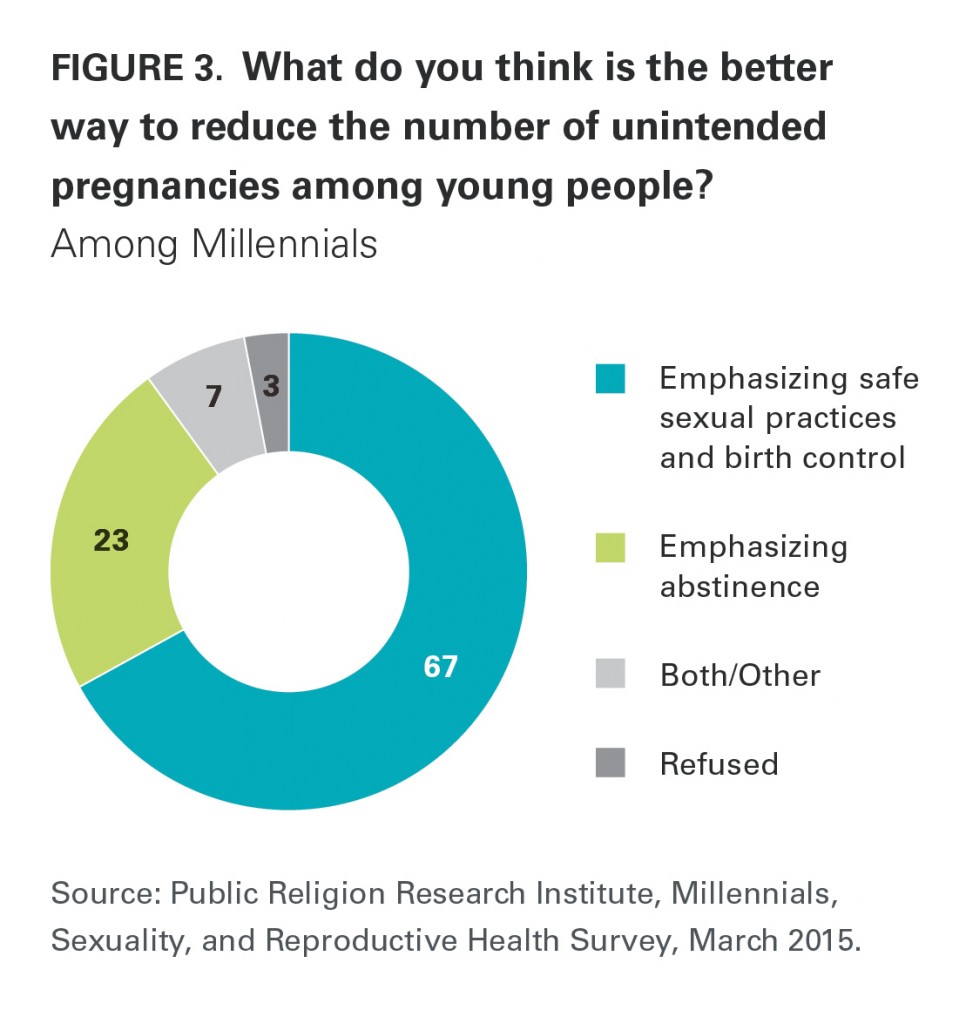 With one important exception—white evangelical Protestants—majorities of millennials in every religious tradition think emphasizing birth control is more effective in reducing unintended pregnancy among young people than promoting abstinence. Eight in ten (80%) religiously unaffiliated millennials and more than seven in ten white mainline Protestant (76%), white Catholic (72%), and Hispanic Catholic millennials (74%) say an emphasis on safe sexual practices and contraception is a better way to prevent unintended pregnancy than an emphasis on abstinence. Nearly two-thirds of black Protestant (64%) and six in ten Hispanic Protestant millennials (59%) also say that an emphasis on safe sex and birth control is the more effective approach. Among white evangelical Protestant millennials, half (50%) say that emphasizing birth control is the better way to avoid unwanted pregnancy among young people, 40% say the reverse, and eight percent say emphasizing both is the best approach.
With one important exception—white evangelical Protestants—majorities of millennials in every religious tradition think emphasizing birth control is more effective in reducing unintended pregnancy among young people than promoting abstinence. Eight in ten (80%) religiously unaffiliated millennials and more than seven in ten white mainline Protestant (76%), white Catholic (72%), and Hispanic Catholic millennials (74%) say an emphasis on safe sexual practices and contraception is a better way to prevent unintended pregnancy than an emphasis on abstinence. Nearly two-thirds of black Protestant (64%) and six in ten Hispanic Protestant millennials (59%) also say that an emphasis on safe sex and birth control is the more effective approach. Among white evangelical Protestant millennials, half (50%) say that emphasizing birth control is the better way to avoid unwanted pregnancy among young people, 40% say the reverse, and eight percent say emphasizing both is the best approach.
There are significant partisan divides among millennials on this question. Nearly eight in ten (79%) millennial Democrats and two-thirds (67%) of millennial independents agree that the best way to reduce the number of unintended pregnancies among young people is by emphasizing safe sexual practices and birth control. A slim majority (51%) of millennial Republicans agree, but four in ten (40%) say emphasizing abstinence is the best approach. Perhaps reflecting their own generally positive experience with sex education classes, there is widespread support among millennials for teaching comprehensive sex education in public schools. Three-quarters (75%) of millennials favor teaching comprehensive sex education in public schools, while 21% are opposed. Support for this policy cuts across all racial, ethnic, and religious groups.
IV. Sexual Health and Support
Health Care Coverage
Roughly eight in ten (81%) millennials report that they currently have health insurance, although coverage varies somewhat by racial and ethnic background. While 11% of white millennials and 14% of Asian-Pacific Islander (API) millennials report that they do not have health insurance, a greater share of black (23%) and Hispanic millennials (28%) say the same.
Among millennials with health insurance, nearly half report that their coverage comes from their employer (38%) or their spouse’s employer (10%). Roughly one-quarter (24%) of millennials report that their health insurance is through their parents and another 15% say they acquired health insurance through a government program such as Medicaid.
Few millennials who are on a parent’s health insurance plan report privacy concerns related to the sharing of their health care information. Only 17% of millennials say they are concerned that their health care decisions might be shared with their parent without their consent, while 81% say they are not concerned about this happening.
Types of Health Services That Should be Covered by Insurance
There is broad agreement among millennials that health insurance should cover both testing and screening for HIV and other STDs, along with prescription contraception. More than eight in ten millennials say that health insurance should include coverage for HIV and STD testing (87%) and prescription contraception (82%). Sixty percent say that emergency contraception should also be covered by health insurance, although support is somewhat greater among millennial women than millennial men (64% vs. 56%, respectively). Millennials are more divided over whether abortion services and erectile dysfunction medication ought to be covered by health insurance. A slim majority (51%) of millennials say that erectile dysfunction medication should be included in health insurance coverage, while 45% disagree. Less than half (45%) of millennials say abortion services should be covered by health insurance, while 51% say they should not be covered. Notably, millennial women and men do not differ in their views about health insurance covering erectile dysfunction medication or abortion.
There are sizable differences of opinion along racial and educational attainment lines about whether abortion services should be covered by health insurance. Roughly four in ten white (43%) and Hispanic millennials (42%) say abortion services should be covered by health insurance, while majorities of both groups (54% and 55%, respectively) disagree. Black millennials are closely divided, with 47% in favor of health insurance covering abortion services and 45% opposed. API millennials stand out from other racial and ethnic groups, with nearly six in ten (57%) supporting the inclusion of abortion services in health insurance coverage.
Views are also stratified by educational attainment. A majority (54%) of millennials who have a four-year college degree say that abortion services should be covered by health insurance, while 43% say it should not. Among millennials with a high school degree or less, only 38% support health insurance covering abortion, while nearly six in ten (57%) are opposed to this.
Trusted Primary Care Physician
Nearly two-thirds (65%) of millennials say that they have a primary care physician whom they trust, while nearly one-third (32%) say they do not. Having a trusted physician is an experience that varies by race and ethnicity. More than seven in ten (71%) white millennials report having a trusted physician, compared to 62% of black, 56% of Hispanic, and 53% of API millennials. Access to health insurance largely influences whether millennials report having a trusted physician; 75% of millennials who are currently covered by health insurance report having a trusted physician, compared to 24% of those without health insurance.
Social Supports for Making Sexual Health Decisions
The degree to which millennials feel very comfortable discussing health issues varies considerably depending on the topic and the other person involved in the conversation. Two patterns stand out consistently across health topics: black millennials are less likely than other millennials to feel very comfortable discussing health matters with their spouse or partner and API millennials are much less likely to feel very comfortable talking about these topics with their parents.
No health topic appears to be more difficult for millennials to talk about than sexual harassment and assault. Only half (50%) of millennials say they would feel very comfortable talking with their spouse or partner about sexual harassment or assault. Even fewer report that they would feel very comfortable talking about this issue with their friends (41%), parents (40%), or doctor (39%). White millennials are much more likely to say they would feel very comfortable talking about this issue with their spouse or partner than black millennials (55% vs. 32%, respectively), while less than half of Hispanic (46%) and API millennials (47%) report they would be very comfortable discussing this topic with their spouse. API millennials (17%) are half as likely as white (42%), Hispanic (42%), and black millennials (39%) to say they would be very comfortable discussing sexual harassment and assault with their parents.
Millennials also express considerable discomfort discussing abortion. Slim majorities say they would feel very comfortable talking about abortion with a spouse or partner (51%) or with their doctor (51%). Only about one-third say they would feel very comfortable talking about abortion with their friends (34%) or parents (34%). There are notable racial and ethnic differences on this issue. While white millennials report feeling about equally comfortable talking about this issue with their partner or spouse (55%) and their doctor (52%), black millennials are more likely to feel very comfortable talking about this issue with their doctor than their spouse or partner (46% vs. 36%, respectively). Hispanic and API millennials are equally comfortable talking with their spouse as their doctor (48% vs. 50% and 53% vs. 54%, respectively). When it comes to contraceptives and birth control, millennials are about as comfortable talking with their doctor (58%) as they are with their spouse or partner (57%), while a smaller percentage report feeling very comfortable talking with their friends (44%) or parents (37%) about this issue. Again, black millennials stand out for being less comfortable talking about this health issue in general. Roughly six in ten white (60%), Hispanic (58%), and API millennials (58%) say they would be very comfortable talking about birth control with their doctor, while only 50% of black millennials say the same. Majorities of white (62%), API (56%), and Hispanic millennials (51%) also report that they would be very comfortable talking to their spouse or partner, a view shared by only 40% of black millennials. Further, white millennials (50%) are more likely to express comfort talking about birth control with their friends than API (36%), Hispanic (36%), or black millennials (33%). Only 11% of API millennials report they would be very comfortable talking about this issue with their parents, compared to 32% of black, 34% of Hispanic, and 43% of white millennials.
Millennials are much more comfortable talking to their doctor about sexually transmitted diseases and infections than anyone else in their social network. More than six in ten (63%) millennials feel very comfortable talking with their doctor about STDs and STIs, including roughly six in ten white (65%), black (58%), Hispanic (61%), and API millennials (61%). Less than half (48%) of millennials overall say they would feel very comfortable talking with their partner or spouse about STDs or STIs. White (51%), API (52%), and Hispanic millennials (46%) are substantially more likely than black millennials (32%) to say they are very comfortable talking about this issue with their partner or spouse.
Millennials are also fairly comfortable talking with their doctor about mental health services for depression or anxiety. A majority (56%) of millennials—including majorities of white (58%), Hispanic (54%), and API millennials (56%)—say they would be very comfortable talking with a doctor or health care provider about depression or anxiety. Less than half (47%) of millennials report they would feel very comfortable talking about issues related to anxiety and depression with their spouse or partner. At 31%, black millennials are less likely to say they would feel very comfortable discussing these issues with a partner or spouse. Startlingly, only 37% of millennials report that they would be very comfortable talking with a therapist or counselor about depression or anxiety.
When it comes to making decisions about having a child or parenting, millennials report being most comfortable talking with their spouse or partner (66%) and, to a lesser extent, parents (56%) and friends (48%). Only 41% of millennials say they would feel very comfortable talking with their doctor about having a child or parenting. White millennials (56%) are substantially more likely to say they are very comfortable talking about this issue with friends than API (44%), black (39%), or Hispanic millennials (33%). Similarly, 61% of white millennials report feeling very comfortable talking about having a child or parenting with their parents, slightly more than what black (51%), Hispanic (49%), and API millennials (47%) report.
Trusted Sources of Information About Sexual Health and Relationships
In seeking out information about sexual health and relationships, millennials most regularly rely on three sources: doctors or health care providers, friends, and the Internet. Close to half of millennials say they regularly receive information about sexual health issues from their doctor (45%), friends (44%), and the Internet (43%). Fewer millennials say they consult their parents for information pertaining to sexual health (30%) and only about one in ten millennials report seeking out this type of information from a religious leader (11%), a therapist (11%), or a teacher (10%). The frequency that millennials consult with these sources varies by race and ethnicity, gender, and age.
Across racial and ethnic backgrounds, millennials are equally likely to rely on their friends for information about sexual health. However, millennial women are somewhat more likely to report consulting their friends at least occasionally than are millennial men (49% vs. 39%, respectively).
API millennials trail millennials overall in their reliance on parents for information about sexual health issues. Only 21% of API millennials report seeking out sexual health information from their parents at least once in a while. Conversely, nearly twice as many Hispanic millennials (39%) say they consult their parents for information about sexual health and relationships. Roughly three in ten white (27%) and black millennials (31%) also report seeking out sexual health information from their parents.
No racial or ethnic group is more reliant on their doctor or health care provider for information about sexual health and relationships than Hispanic millennials. Nearly six in ten (59%) Hispanic millennials receive information from their doctor at least once in a while on this topic, compared to less than half of API (48%), black (49%), and white millennials (38%).
A majority of Hispanic (52%) and API millennials (57%) report that they rely on the Internet for information about sexual health and relationships at least occasionally. In contrast, less than half of black (44%) and white millennials (36%) say they use the Internet to get information about sexual health issues.
Experiences with Sexual Health Issues Among Millennial Women
The most common sexual health experience reported among millennial women was the use of emergency contraception. Nearly one in five (18%) millennial women report having used emergency contraception at some point, and roughly three in ten (29%) say a close friend or family member has used this form of birth control. Less than one in ten (7%) millennial women report having an unintended pregnancy, although this experience is common within their social network—42% report that this has happened to a close friend or family member. Eight percent of millennial women report that they themselves have had an abortion, but four times as many (36%) say a close friend or family member has had an abortion. A similar number of millennial women (9%) report that they became a parent as a teenager, while nearly half (46%) of millennial women say that a close friend or family member became a parent as a teenager.
The sexual health experiences of millennial women vary considerably by race and ethnicity. Hispanic millennial women report higher usage of emergency contraception than millennials overall. More than one in four (26%) Hispanic millennial women report having used emergency contraception, compared to less than one in five white (14%), black (17%), and API millennial women (18%).
More than any other racial or ethnic group, black millennial women are more likely to know someone who has had an abortion. Nearly six in ten (58%) black millennial women report having a close friend or family member who has had an abortion. In contrast, less than four in ten Hispanic (39%), API (32%), and white millennial women (28%) report that a close friend or family member has had an abortion.
With the exception of using emergency contraception, API millennial women are less likely than other millennials to have experienced any of these sexual health events, either personally or among their friend and family network. For instance, only one-quarter (25%) of API millennial women say they have a close friend or family member who had an unintended pregnancy, substantially fewer than among white (36%), Hispanic (54%), or black millennial women (55%).
Experiences with HIV/AIDS
Only one percent of millennials overall report that they themselves are HIV positive or have AIDS, but 13% report that they have a close friend or family member living with HIV or AIDS. With the exception of white millennials—among whom zero percent report that they are HIV positive or have AIDS—there are only modest differences in self-reported status among black (1%), Hispanic (3%), and API millennials (4%).
However, there are larger experiential differences among ethnic groups’ social networks. Black (23%) and Hispanic millennials (21%) are more than twice as likely as white (8%) or API millennials (9%) to say they have a close friend or family member who is HIV positive or has AIDS. There are also significant differences between the experiences of black men and black women. Twenty-eight percent of black millennial women report having a close friend or family member who has HIV/AIDS, compared to 17% of black millennial men.
V. Attitudes About Contraception
Morality and Availability of Contraception
More than seven in ten (71%) millennials say that using artificial birth control is morally acceptable, compared to fewer than one in ten (9%) who say it is morally wrong. Fourteen percent say it depends on the situation. Overwhelming majorities of virtually every subgroup of millennials say it is morally acceptable to use contraception. Seven in ten or more Democratic (75%), independent (70%), and Republican millennials (71%) say it is morally acceptable to use contraception, as do majorities of all major religious groups, including 76% of white evangelical Protestant, 72% of white Catholic, and 68% of Hispanic Catholic millennials.
There is also broad agreement across subgroups that contraception should be made readily available on college campuses. Nearly eight in ten (78%) millennials favor making all forms of legal contraception readily available on college campuses. Only about one in five (19%) millennials disagree.
Availability of Emergency Contraception
Millennials’ general support for making contraception more widely available also extends to emergency contraception, although there are significant divisions along political and religious lines on this issue. Most millennials (55%) oppose requiring a prescription to obtain emergency contraception, like the “morning after” pill, while 40% are in favor of this requirement. Millennial men are about as likely as millennial women to oppose a prescription requirement (55% vs. 57%, respectively). There are modest differences by race and ethnicity. Majorities of white (60%) and black millennials (54%) oppose requiring a prescription for emergency contraception, while Hispanic (49% favor, 48% oppose) and Asian-Pacific Islander (API) millennials (43% favor, 50% oppose) are more divided.
Nearly two-thirds of Democratic millennials (64%) and a majority of millennial independents (56%) oppose requiring a prescription to obtain emergency contraception. By contrast, only 43% of Republican millennials oppose a prescription requirement, while 54% support it.
Among religious groups, majorities of black Protestant (54%), white mainline Protestant (61%), and religiously unaffiliated millennials (74%) oppose requiring a prescription for obtaining emergency contraception. Hispanic Catholic and white Catholic millennials are evenly divided, with an equal number expressing support for the prescription requirement as opposition (49% vs. 49% for both groups). In contrast, majorities of white evangelical Protestant (54%) and Hispanic Protestant millennials (55%) favor a prescription requirement for emergency contraception.
Access to Contraception and Financial Security
Millennial attitudes about contraception are at least partly informed by the belief that access to birth control is an issue of financial security for women. Six in ten (60%) millennials agree that access to contraception is critical for the financial security of women, while more than one-third (36%) disagree. There are no significant differences of opinion by race or ethnicity, but there are sizable differences between the perspectives of millennial men and women on this issue.
Overall, millennial women are more likely than millennial men to say that access to contraception is critical to the financial well-being of women (64% vs. 55%, respectively), although the size of the gender gap varies substantially among racial and ethnic groups. While nearly two-thirds (65%) of white millennial women say access to contraception is crucial for the economic stability of women, roughly half (51%) of white millennial men agree. Similarly, 62% of black millennial women agree that having access to contraception is crucial for a woman’s financial security, a view shared by less than half (49%) of black millennial men. Notably, there is no significant gender gap within Hispanic millennials; more than six in ten Hispanic millennial women (63%) and Hispanic millennial men (64%) agree that financial security for women is dependent on access to contraception.
There are also differences along political lines. Republican millennials are far more likely to dispute the notion that contraception is critical for women’s financial security than independent and Democratic millennials. Seventy-three percent of Democratic millennials and 58% of independent millennials say that access to contraception is critical for women, while less than half (44%) of Republican millennials agree. A majority (55%) of Republican millennials disagree that there is a link between access to contraception and financial well-being for women.
Despite disagreement about the degree to which access to birth control is critical for a woman’s financial well-being, there is widespread support for expanding access to birth control for women who cannot afford it. Eight in ten (81%) millennials favor increasing access to contraception for women who cannot afford to pay for it. Only 15% of millennials oppose this policy. Notably, this support for increasing access to birth control for women cuts across all racial, ethnic, religious, and political groups.
Requirements for Employers to Provide Contraception Coverage in Health Care Plans
Millennials are generally supportive of requiring most types of employers to provide their workers with health care plans that cover contraception at no cost. Majorities of millennials say that religiously affiliated colleges (53%), religiously affiliated hospitals (55%), and privately owned corporations (58%) should be required to provide their employees with health care plans that cover contraception. Overall, the only institution for which millennials make an exception is churches and places of worship, but even here, nearly half (44%) say these organizations should be required to provide this type of coverage, while a slim majority (51%) disagrees.
There are notable differences of opinion on this issue by gender and race. More than six in ten (62%) millennial women say that privately owned corporations should be required to provide health insurance plans that cover contraception at no cost for their employees, compared to 55% of millennial men. API and Hispanic millennials are most supportive of requiring organizations to provide employees with health insurance that covers contraception. Roughly two-thirds of API (64%) and Hispanic millennials (67%) say privately owned corporations should have to provide employees with health care plans that include coverage for contraception, compared to 57% of black and 55% of white millennials.
Not surprisingly, there are large partisan differences on this issue, particularly on requirements for privately owned corporations. While 73% of Democratic and 57% of independent millennials say privately owned corporations should be required to provide contraception coverage in employees’ health care plans, only 38% of Republican millennials agree. About six in ten (61%) Republican millennials say that privately owned corporations should not have to provide contraception coverage.
Among religious groups, white evangelical Protestant millennials are unique in their opposition to any organization being required to provide health care coverage for employees that includes contraception. While at least six in ten white mainline Protestant (63%), black Protestant (61%), white Catholic (60%), Hispanic Catholic (68%), Hispanic Protestant (67%), and religiously unaffiliated millennials (72%) say privately owned corporations should have to provide employees with health insurance that covers contraception, only 38% of white evangelical Protestant millennials say the same. More than six in ten (62%) white evangelical Protestant millennials say privately owned corporations should not have to provide employees with this type of health insurance.
VI. Attitudes About Abortion
The Legality of Abortion
Despite large generational gaps on issues like same-sex marriage or the legalization of marijuana, millennial attitudes about the legality of abortion generally mirror the attitudes of the general public.(4) A majority of millennials say that abortion should be legal in most cases (33%) or legal in all cases (22%), while more than four in ten say it should be illegal in most cases (27%) or illegal in all cases (15%). Like the general public, there are substantial divisions on the issue among millennials by education, race and ethnicity, and religious and party affiliation. Notably, however, there are no significant differences between the opinions of millennial men and millennial women on the issue of abortion.
Millennial attitudes about abortion are strongly influenced by religious identity. Of seven major religious groups, including the religiously unaffiliated, three say abortion should be legal in all or most cases, one group is nearly evenly divided, and three say abortion should be illegal in all or most cases.
On one side, at least six in ten black Protestant (61%) and white mainline Protestant millennials (63%) say it should be legal in all or most cases, as do 79% of religiously unaffiliated millennials. White Catholic millennials are evenly split between those who say abortion should be legal in all or most cases (51%) and those who say it should be illegal in all or most cases (49%). On the opposing side, majorities of Hispanic Catholic (55%) and Hispanic Protestant millennials (61%) think abortion should be illegal in all or most cases. White evangelical Protestant millennials stand out as the group most opposed, with eight in ten (80%) saying abortion should be illegal in all or most cases.
Differences by race and ethnicity are generally more modest, but Hispanic millennials are less likely than other millennials to support the legality of abortion. A majority of white (56%), black (59%), and Asian-Pacific Islander (API) millennials (66%) say abortion should be legal in all or most cases. In contrast, less than half (45%) of Hispanic millennials agree with their peers; a majority (54%) says abortion should be illegal in all or most cases.
Hispanic millennial attitudes on abortion are strongly influenced by two important characteristics: country of birth and frequency of religious attendance. A majority (52%) of Hispanic millennials who were born in the U.S. say abortion should be legal in all or most cases, compared to 37% of Hispanic millennials who were born outside the U.S. Nearly two-thirds (63%) of foreign-born Hispanic millennials say abortion should be illegal in all or most cases. The opinion gap between Hispanics who attend religious services often and those who do not is even broader. Only 20% of Hispanics who attend religious services weekly or more often say abortion should be legal in all or most cases, while fully 80% say abortion should be illegal in all or most cases. By contrast, among Hispanics who say they seldom or never attend religious services, nearly two-thirds (64%) say abortion should be legal in all or most cases, and 35% say it should be illegal in all or most cases.
Partisan differences among millennials on the issue of abortion reflect the polarization in the population at large. Nearly three-quarters (74%) of Democratic millennials and a majority (53%) of politically independent millennials say abortion should be legal in all or most cases, compared to only 32% of Republican millennials. More than two-thirds (68%) of Republican millennials say abortion should be illegal in all or most cases.
Additionally, millennial women who report that they themselves, a close friend, or a family member has had an abortion are strongly supportive of its legality. Among women who report having had an abortion, nearly eight in ten (79%) say abortion should be legal in all or most cases, compared to 20% who say it should be illegal. Similarly, among millennial women who have a close friend or family member who has had an abortion, 63% say it should be legal in all or most cases, compared to 37% who say it should be illegal.
The Availability of Abortion
Consistent with their views on the legality of abortion, a majority (55%) of millennials say at least some health care professionals in their community should provide legal abortions, 36% disagree, and seven percent say they are unsure or that it depends on the circumstances. Nearly seven in ten (69%) millennials living in the Northeast and a majority (56%) of millennials living in the West say that at least some health care professionals in their community should provide legal abortions. The views of millennials in the Midwest and South are more divided, with half (50%) saying at least some health care professionals in their community should provide legal abortions and 41% in disagreement.
A majority (56%) of millennials also oppose making it more difficult for a woman to get an abortion, compared to 40% who favor such policies. Majorities of millennials in the Northeast (64%), South (58%), and West (55%) say they oppose making it more difficult for a woman to get an abortion. Millennials in the Midwest are divided about whether it should be more difficult for a woman to get an abortion (47% oppose, 48% favor).
Views about the availability of abortion and restrictions on abortion closely track views about abortion legality and response patterns among millennials by race and ethnicity, education, and religious and political affiliation are nearly identical.
Notably, millennials’ personal experiences with abortion impact their views about policies that restrict access to abortion. Among millennial women who report that they themselves have had an abortion, 73% oppose making it more difficult for a woman to get an abortion. Similarly, among millennials who report that they have a close friend or family member who has had an abortion, 64% oppose making it more difficult for a woman to obtain an abortion.
While a majority of millennials are supportive of the legality of abortion and the availability of abortion services, most oppose a policy that makes abortion legally available to young people age 16 or older without parental approval. Nearly six in ten (59%) millennials oppose making abortion services available to young women age 16 or older without parental consent, while 37% support this policy. There are modest differences across racial and ethnic groups. Majorities of black (53%), white (60%), and Hispanic millennials (64%) oppose making abortion available to young people age 16 or older without parental approval. At least partially reflecting their greater reluctance to discuss abortion and other sexuality issues with their parents, API millennials are more supportive than millennials of other racial and ethnic groups of a policy that makes abortion services legally available to young people who are age 16 or older (44% favor, 50% oppose).
Perceptions of Difficulty Obtaining an Abortion
A majority of millennials say it is either not too difficult (39%) or not at all difficult (14%) for a woman to get an abortion in their community, compared to roughly four in ten who say it is somewhat (32%) or very difficult (11%). Perceptions about how easy or difficult it is to obtain an abortion vary only modestly among millennials by race and ethnicity, gender, and religious affiliation. However, reflecting the policy differences on the ground, regional differences are fairly stark. Half (50%) of millennials living in the South say it is somewhat or very difficult to obtain an abortion in their community, compared to roughly four in ten millennials living in the West (40%) and Midwest (42%). By contrast, only one-third (33%) of millennials living in the Northeast say it is somewhat or very difficult for a woman to get an abortion in their community.
The “Pro-life” and “Pro-choice” Labels
Most millennials appear uncomfortable attaching themselves exclusively to the “pro-life” and “pro-choice” labels that have defined the abortion debate for decades. A majority (54%) of millennials say the label “pro-choice” describes them somewhat or very well, but a nearly identical number (52%) also say the label “pro-life” describes them somewhat or very well. Analyzing these independent questions together reveals that millennials divide nearly evenly into fourths with regard to these labels.
At the poles, only about one-quarter of millennials identify exclusively as “pro-life” (25%) and “pro-choice” (27%). Approximately as many millennials (27%) say that both labels describe them equally well, while 22% say neither label describes them well. There are no differences between millennial men and women, but the willingness to embrace these labels varies considerably by racial and ethnic background.
White millennials are more stratified than non-whites by the “pro-choice” and “pro-life” labels that have defined the political debates. Roughly one-third of white millennials identify exclusively as “pro-life” (29%), while a similar number identify exclusively as “pro-choice” (31%). About one-quarter (24%) embrace both labels, while 16% say neither label describes them well.
As figure 7 illustrates, Hispanic, API, and black millennials are much less likely to identify exclusively with one of these labels. For instance, only about three in ten black millennials identify exclusively as either “pro-life” (11%) or “pro-choice” (19%). Nearly seven in ten black millennials identify with both labels (35%) or with neither label (34%).
VII. The Situationalist Ethics of Millennials on Sexual Behavior
When evaluating the morality of sexual behaviors, millennials generally do not make black-andwhite judgments, but rather factor circumstances into their reasoning. In fact, across seven behaviors related to sexuality, there were no issues for which a majority pronounced them morally wrong in general. For example, while 41% of millennials say that sex between two people under the age of 18 is morally wrong—compared to one-quarter (24%) who say it is morally acceptable—nearly three in ten (29%) say it depends on the circumstances. Similarly, equal numbers of millennials say sex between two adults who have no intention of forming a relationship is morally wrong (37%) as say it is morally acceptable (37%), but about one in five (21%) say it depends on the situation.
Overall, there are no large differences in moral evaluations of sexual behavior across racial or ethnic groups, with two notable exceptions. Black and Hispanic millennials are much less accepting of sex between minors than white and Asian-Pacific Islander (API) millennials are, and Hispanic millennials hold more reservations about the morality of having an abortion. Roughly half of black (50%) and Hispanic millennials (48%) say sex between two people under the age of 18 is morally wrong, while less than four in ten white (37%) and API millennials (39%) say the same.
College experience also makes a significant difference in how millennials evaluate sexual behaviors, particularly issues of casual sex, sex between adults of the same gender, and cohabitation. Nearly half (46%) of college-educated millennials say that sex between two adults who have no intention of establishing a relationship is morally acceptable, compared to roughly one-third (31%) of millennials with a high school degree or less. Millennials with a four-year college degree are also more likely than those with a high school degree or less to say that sex between two adults of the same gender is morally acceptable (51% vs. 34%, respectively). College-educated millennials are also much more accepting of pre-marital cohabitation. Nearly six in ten (58%) college-educated millennials say it is morally acceptable for a couple to live together without intending to get married, a position embraced by only 41% of millennials with a high school degree or less.
Circumstances and Moral Evaluations of Decisions to Have an Abortion
On the issue of abortion, millennials strongly factor specific circumstances into their moral evaluations. More than one-third (35%) of millennials say having an abortion is morally wrong, compared to 21% who say it is morally acceptable—but a plurality (39%) say that the morality of a decision to have an abortion depends on the particular situation.
Compared to other ethnic groups, Hispanic millennials exhibit the greatest moral reservations about having an abortion. Close to half (45%) of Hispanic millennials say having an abortion is morally wrong, compared to 35% of white, 30% of black, and 23% of API millennials. However, the importance of circumstances is apparent even among Hispanic millennials. While only 16% of Hispanic millennials say having an abortion is morally acceptable in general, 36% say the morality of the decision depends on the situation.
Millennials who have some kind of personal experience with abortion are less likely to say having an abortion is morally wrong. Among millennials who have had an abortion themselves or have a close friend or family member who has had an abortion, 30% say having an abortion is morally wrong, compared to 38% of millennials who lack such experiences.
The prominent place of circumstances in millennials’ moral reasoning on abortion and a reticence to render black-and-white moral judgments is also reflected in a separate, but related, question in the survey. Most millennials (56%) agree that in certain circumstances, having an abortion is the most responsible decision a woman can make, compared to 40% who disagree. A majority of white (55%), black (59%), and API millennials (70%) agree that in some circumstances, having an abortion can be the most responsible decision a woman can make. Hispanics are closely divided over whether having an abortion can be the most responsible decision or not (51% vs. 46%, respectively).
VIII. Sexuality and Social Stigma
Types of People Facing Social Stigma
Millennials say that no group faces more negative social judgment than transgender people. Nearly half (47%) of millennials say that transgender people face a lot of stigma in their community. More than one-third of millennials say that a person living with HIV or AIDS (36%), a pregnant woman under the age of 18 (34%), and parents under the age of 18 (34%) also face a lot of negative social judgment in their community. Fewer than three in ten millennials say that gay or lesbian people (29%) or a woman who has had an abortion (24%) face a lot of stigma in their community. Significantly fewer millennials say that a woman who has a child and is not married (14%) or a woman who has been sexually assaulted (14%) faces a lot of negative social judgment in their community. Perceptions of stigma vary substantially by gender and racial and ethnic background.
In general, millennial women are more likely than millennial men to say various types of people face a lot of stigma or negative social judgment. A slim majority (51%) of millennial women say transgender people face negative social judgment, compared to 43% of millennial men. Millennial women are also more likely than millennial men to say that people living with HIV or AIDS face a lot of stigma (42% vs. 31%, respectively). Millennial women are more likely than their male counterparts to say that teen parents face a lot of negative social judgment in their community (39% vs. 28%, respectively). Nearly three in ten (29%) millennial women say that a woman who has an abortion faces a lot of stigma, compared to 19% of millennial men.
Perceptions of social stigma also vary by racial and ethnic background. Black millennials are more likely than millennials overall to report that someone living with HIV or AIDS faces a lot of discrimination in their community. Nearly half (45%) of black millennials say that a person with HIV or AIDS faces a lot of discrimination in their community, compared to less than four in ten white (34%), Asian-Pacific Islander (API) (36%), and Hispanic millennials (38%). Black millennials are also more likely than other millennials to say that gay and lesbian people confront a lot of stigma in their community. Four in ten (40%) black millennials say gay and lesbian people face a lot of negative social judgment in their community. Less than one-third of Hispanic (32%), white (27%), and API millennials (19%) say gay and lesbian people face considerable stigma in their communities.
There are important gender differences among black millennials in perceptions of groups facing social stigma. A majority (52%) of black millennial women, but only about one-third (36%) of black millennial men, say someone with HIV or AIDS faces a lot of stigma in their community. Similarly, 47% of black millennial women say that gay and lesbian people confront a lot of negative social judgment in their community, a view shared by 31% of black millennial men.
API millennials are more likely than other millennials to report that there is a lot of stigma in their community associated with teen pregnancy or parenting. More than four in ten (42%) API millennials say a teenager who becomes pregnant faces a lot of stigma in their community, compared to 34% of millennials overall. Similarly, 40% of API millennials say a teenager who is already a parent faces a lot of stigma.
Appropriate Responses to Pregnant Teens
Millennials are more likely to support non-judgmental responses when a young woman under the age of 18 becomes pregnant, although a significant minority expresses some reservations about an exclusively non-judgmental response. Close to half (47%) of millennials say that when a young woman under the age of 18 becomes pregnant, her community and family should not judge her, but rather provide help and support. Eleven percent says offering only non-judgmental support sends the wrong message—that teenage pregnancy is fine. Roughly one-quarter (26%) of millennials affirm both approaches, while 13% say the family and community should adopt neither.
IX. Sexual Assault and Sexual Harassment on Campus and at Work
Personal Experience with Sexual Assault
Fifteen percent of millennial women report that they themselves have been sexually assaulted, and more than twice that number (34%) report that this has happened to a close friend or family member. Among millennial men, only three percent report that they themselves have been sexually assaulted, but 25% say that a close friend or family member has been the victim of sexual assault.
There are large disparities in experiences with sexual assault by race and ethnicity. Among black millennial women, nearly one in five (19%) report being the victim of sexual assault and twice as many (38%) say a close friend or family member has experienced sexual assault. The experiences of white and Hispanic millennial women mirror the experiences of millennial women overall. Asian-Pacific Islander (API) women, by contrast, report much lower levels of both being the victim of sexual assault themselves (5%) or having a close friend or family member who has been sexually assaulted (25%).
Perceived Frequency of Sexual Assault on Campuses
Millennials see sexual assault as a startlingly common problem in schools and workplaces, and they see the problem as particularly pervasive on college campuses. Nearly three-quarters of millennials say sexual assault is somewhat (34%) or very common (39%) in colleges and universities, compared to only about one-quarter who reports that it is somewhat (19%) or very rare (5%). Fewer, but still a majority of millennials (53%), say incidents of sexual assault are somewhat or very common in high schools, while 44% say they are somewhat or very rare. Far fewer millennials see sexual assault as a common problem in middle schools, but even in this early teen setting, 29% say the issue is somewhat or very common.
Black millennial women are the most likely to say sexual assault is prevalent in middle schools, with half (50%) saying the issue is at least somewhat common there. In contrast, less than three in ten (27%) black millennial men say sexual assault in middle schools is very or somewhat common. There is a much smaller gender gap between white millennial men (21%) and women (30%) and between Hispanic millennial men (31%) and women (39%), all of whom are much less likely than black millennial women to see sexual assault as a common problem in middle schools.5
Black millennial women are also the most likely to say sexual assault is a common problem in high schools, with no less than seven in ten (70%) saying it is very or somewhat common there. Black millennial men express similar evaluations, with two-thirds (66%) saying sexual assault is very or somewhat common in high schools. A larger gender gap exists among white and Hispanic millennials; 59% of white and 60% of Hispanic millennial women say sexual assault is very or somewhat common in high schools, compared to only 44% of white and 49% of Hispanic millennial men who say the same.
There is greater agreement among millennial men and women about the prevalence of sexual assault on college campuses. More than seven in ten millennial men (71%) and women (75%) say that sexual assault is somewhat or very common at colleges and universities in the U.S. Perceptions of the prevalence of sexual assault are not significantly different among those who attended different college types, such as public colleges, private non-religious colleges, and private religiously affiliated colleges.
Notably, white millennial women are significantly more likely than white millennial men to say that sexual assault is very common on college campuses (40% vs. 26%, respectively). There are no similar intensity differences between black and Hispanic men and women.
The racial divide in perceptions of the prevalence of sexual assault remains. More than eight in ten (81%) black millennials say sexual assault is somewhat or very common in colleges and universities, compared to less than three-quarters of white (74%), Hispanic (70%), and API millennials (63%).
Perceived Frequency of Sexual Assault at Workplaces
Millennials are divided over how common of an occurrence sexual assault is in workplaces and businesses. Half (50%) of all millennials say it is at least somewhat common, while nearly as many (47%) say it is somewhat or very rare. As with perceptions of sexual assault on campuses, there are gender and racial differences in perceptions of the frequency of sexual assault in the workplace.
Among millennials overall, women are significantly more likely than men to see sexual assault as a somewhat or very common problem in the workplace (54% vs. 45%, respectively). Black millennial women are also the most likely to see sexual assault as a prevalent problem in workplaces and businesses. Nearly seven in ten (69%) black millennial women say sexual assault is very or somewhat common there, while more than six in ten (62%) black millennial men say the same.
Perceptions of How Campuses and Workplaces are Handling Sexual Assault
Given the perceptions about the prevalence of sexual assault, it is no surprise that colleges and universities receive poor marks from millennials for their handling of the problem of sexual assault. Six in ten (60%) millennials say colleges or universities are not doing enough to address the problem of sexual assault, compared to only about one-third (34%) who say they are. Millennials rate high schools only slightly higher, with 41% of millennials agreeing that high schools are doing enough to address the sexual assault issue and 53% disagreeing. Millennials are divided about whether middle schools (49% agree, 45% disagree) and workplaces (48% agree, 46% disagree) are doing enough to handle the problem.
In general, millennial women are more likely than millennial men to say that not enough is being done to address the problem of sexual assault, although the size of the gender gap varies across different settings. For example, nearly six in ten (59%) millennial women, compared to only 47% of millennial men, say that high schools are not doing enough to address the issue of sexual assault. A majority of both millennial women (63%) and men (56%) say that colleges and universities have not responded adequately to the issue of sexual assault on campus. Fewer than half of both millennial women (49%) and men (42%) say that businesses and workplaces are not doing enough to address sexual assault.
There is a larger gender gap among white millennials than among Hispanic and black millennials on whether schools are doing enough to deal with sexual assault; these differences are the most pronounced with regard to high schools. White millennial women are much more likely than white millennial men (62% vs. 47%, respectively) to say high schools are not doing enough to address sexual assault. In contrast, there is much more agreement between men and women when looking at Hispanic and black millennial attitudes. A majority of both black millennial women (57%) and men (52%) agree that high schools are not addressing the issue of sexual assault adequately.
Frequency of Sexual Harassment in Schools and Workplaces
Millennials say that sexual harassment is an even more common occurrence than sexual assault in most settings.
A majority (52%) of millennials say the problem of sexual harassment is very or somewhat common in middle schools, while 46% say it is not that common in this setting. Roughly three-quarters of millennials say sexual harassment is very or somewhat common in high schools (75%) and workplaces (73%). Eight in ten (80%) millennials say sexual harassment is very or somewhat common in colleges or universities. Views about the prevalence of sexual harassment are similar among millennials of different religious and racial backgrounds.
X. Discrimination in Society
Discrimination Against Women in the Workplace
Most millennials believe that discrimination against women, especially women in the workplace, remains a significant problem in the U.S. Nearly six in ten (58%) millennials agree that women get fewer opportunities than men for good jobs, compared to about four in ten (38%) who disagree. Nearly two-thirds (64%) of millennials agree that women still do not receive equal pay for equal work, while 32% disagree. A majority of millennials also support employers making special efforts to hire and promote women to address gender discrimination. About six in ten (61%) millennials agree that because of historical and existing bias, employers should make special efforts to hire and promote qualified women, compared to 35% of millennials who disagree.
Large gender gaps persist across all three workplace discrimination questions. Millennial women are much more likely than millennial men to agree that women get fewer opportunities than men for good jobs (67% vs. 49%, respectively) and that women still do not receive equal pay for equal work (72% vs. 56%, respectively). There is also a substantial gap between millennial women and men in support of employers making special efforts to hire and promote qualified women because of current and past discrimination (68% vs. 53%, respectively).
Views about gender discrimination are strongly polarized by political affiliation. Democratic millennials are much more likely than their Republican counterparts to agree that women get fewer opportunities than men for good jobs (70% vs. 50%, respectively), that women still do not receive equal pay for equal work (72% vs. 55%, respectively), and that employers should make special efforts to hire and promote qualified women due to historical and existing bias (72% vs. 49%, respectively).
Interestingly, there are no significant racial differences about the existence of discrimination against women in the workplace, but the extent to which millennials say employers should make special efforts to hire and promote women varies significantly by race and ethnicity. More than seven in ten (72%) Hispanic millennials say that because of historical and existing bias, employers should make special efforts to hire and promote qualified women, while over six in ten black (67%) and Asian-Pacific Islander (API) millennials (61%) also agree with the statement. A smaller majority (55%) of white millennials agree that employers should be making a special effort to recruit and reward women. White millennial men are unique among millennial men for their belief that employers should not make special efforts to employ and promote qualified women. Fewer than half (46%) of white millennial men say employers should make special efforts to bring women into the workforce, compared to 60% of black millennial men and 70% of Hispanic millennial men.
Most millennials also reject the notion that general discrimination against women in American society is no longer a problem. About one-third (34%) of millennials say that discrimination against women is no longer a problem in the U.S., while 62% disagree. There are modest gender and racial divides in attitudes about gender discrimination in the U.S. Fewer than three in ten (29%) millennial women agree that discrimination against women is no longer a problem in the U.S., compared to nearly four in ten (39%) millennial men. Hispanic (39%) and white millennials (36%) are the most likely to say that discrimination against women is no longer a problem, while fewer black (27%) and API millennials (27%) agree.
Discrimination Based on Sexual Orientation and Gender Identity
Millennials draw no distinctions between discrimination protections that should be afforded gay and lesbian people, on the one hand, and transgender people on the other. More than seven in ten (73%) millennials support legal protections against discrimination in jobs, public accommodations, and housing for gay and lesbian people. A nearly identical number (72%) of millennials say they favor these same protections for transgender people.
While no significant racial or gender differences exist on either question, there are large religious divides in support for expanding nondiscrimination legislation. Roughly eight in ten black Protestant (80%), white Catholic (82%), Hispanic Catholic (81%), religiously unaffiliated (83%), and white mainline Protestant millennials (78%) favor laws that would protect gay and lesbian people against discrimination in jobs, public accommodations, and housing. About two-thirds (66%) of Hispanic Protestant millennials also favor such laws. White evangelical Protestants are closely divided on this issue, with a slim majority (51%) favoring laws that would protect gay and lesbian people against discrimination, and 47% opposing them. Among religious groups, the pattern of opinion about non-discrimination legislation protecting transgender individuals is nearly identical.
XI. Gender Roles and Marriage
Gender Roles, Work, and Family Life
Millennials view women having a full-time job as a less serious problem for families than men who concentrate too much on work. Roughly two-thirds (66%) of millennials disagree that family life suffers when the woman has a full-time job, compared to 30% who agree. Millennials are nearly evenly split over whether family life suffers because men concentrate too much on their work (49% agree, 47% disagree). Millennial men and women are about equally likely to see men who work too much, rather than women who work full-time, as the greater threat to family life. There are notable differences in opinion by race and ethnicity.
Hispanic millennials are more likely than other millennials to perceive women having full-time jobs and men concentrating too much on their work as an impediment to healthy family life. More than four in ten (44%) Hispanic millennials agree that family life suffers when the woman has a full-time job, compared to less than one-third of black (31%), white (26%), and Asian-Pacific Islander (API) millennials (23%). Six in ten (60%) Hispanic millennials also think that family life often suffers because men concentrate too much on their work, while about half (51%) of API millennials and slightly less than half of black (47%) and white (46%) millennials say the same.
Millennial attitudes about gender roles also vary significantly by education. Millennials with a high school degree or less are roughly twice as likely as those with a college education to think that family life suffers if the woman has a full-time job (38% vs. 20%, respectively). Notably, millennials with a high school degree or less are no more likely than those with a college degree to say that family life suffers if men focus too much on their work (50% vs. 44%, respectively).
Divisions of Responsibilities in Relationships
Millennials are split on the necessity of romantic partners dividing family and household responsibilities evenly. A slim majority (51%) of millennials agree that it is not that big of a deal if one person in a relationship takes on most of the family and household responsibilities, while 46% disagree. Notably, the opinions of married millennials are nearly identical to those who are single.
There is only a modest gender gap on the question. Nearly half (47%) of millennial women and a majority (54%) of millennial men agree that it is not a big deal if one person in a relationship takes on most of the family and household responsibilities.
When it comes to their own relationships, millennials who live with their partner or spouse overwhelmingly say they are satisfied with the division of labor in their relationship. Nearly nine in ten millennials who live with a partner or spouse say they are very (51%) or somewhat (35%) satisfied with the way household tasks are currently divided, compared to only about one in ten who are somewhat (9%) or very (4%) dissatisfied. No significant gender or racial divisions exist in feelings about personal satisfaction with how household labor is divided.
The Institution of Marriage
Despite the fact that millennials are marrying, on average, much later than previous generations,6 they generally view the institution in a positive light. Only one-quarter (25%) of millennials agree that marriage has become old-fashioned and out of date, while about seven in ten (71%) disagree. Both married and single millennials offer nearly the same positive assessment of marriage. There are modest differences by race and ethnicity, with black and Hispanic millennials expressing somewhat more negative views about marriage.
Only about one in five API (18%) and white millennials (21%) say marriage has become old fashioned and out of date, while roughly one-third of black (31%) and Hispanic millennials (33%) express this negative attitude about marriage.
XII. Sexual Identity and Attraction
Nearly nine in ten (88%) millennials identify as heterosexual or straight, while one percent identify as lesbian, two percent as gay, and four percent as bisexual. In a separate question, another one percent identify as transgender. Taken together, seven percent of millennials identify either as lesbian, gay, bisexual, or transgender (LGBT). Three percent of millennials refused to identify their sexual orientation.
There are no significant differences across races in LGBT identity, but there are modest religious and political differences. More than one in ten (12%) religiously unaffiliated millennials identify as LGBT, compared to six percent of white mainline Protestant, six percent of Hispanic Catholic, five percent of Hispanic Protestant, five percent of black Protestant, two percent of white Catholic, and just one percent of white evangelical Protestant millennials. Democratic millennials are significantly more likely to identify as LGBT than Republican millennials (10% vs. 2%).
In terms of sexual attraction, millennial women are twice as likely as millennial men to say they are sexually attracted to someone of the same gender (14% vs. 7%, respectively). A small number of millennials who do not identify as LGB still report experiencing same-gender attraction. Among millennial women who do not identify as lesbian or bisexual, eight percent say they are sexually attracted to other women.
While about eight in ten (82%) millennials report that their understanding of their own sexual orientation has not changed since they were young adolescents, 15% say their understanding has changed. There are no significant differences by gender, race and ethnicity, or religious affiliation.
Endnotes
1 In this introductory section, all demographic, religious, and political data are based on PRRI’s American Values Atlas (AVA) in order to facilitate profile comparisons among millennials, seniors, and the general population. The AVA contains a sample size of over 50,000 respondents, including 12,528 millennials. Also note that in order to preserve generational consistency, we used a definition of millennials in the AVA of 18- 34 years of age, since data collection for that dataset was completed in 2014.
2 Here and throughout the report, “white” refers to non-Hispanic whites, “black” refers to non-Hispanic blacks, and we use the acronym “API” to refer to respondents who self-identify as Asian-Pacific Islander.
3 The category of white Christian includes those who identify as white evangelical Protestant, white mainline Protestant, white Catholic, or Mormon.
4 According to PRRI’s 2014 American Values Atlas, 55% of Americans believe abortion should be legal in all or most cases, compared to 41% who say it should be illegal in all or most cases.
Recommended citation:
Jones, Robert P., and Daniel Cox. “How Race and Religion Shape Millennial Attitudes on Sexuality and Reproductive Health.” PRRI. 2015. http://www.prri.org/research/survey-how-race-and-religion-shape-millennial-attitudes-on-sexuality-and-reproductive-health/.


